
















































































































Editor: Denise Maguire

Creative Director: Jane Matthews

Designers: Alan McArthur Neasa Daly

Production Executive: Nicole Ennis



Managing Director: Gerry Tynan Chairman: Diarmaid Lennon
Email: info@ashville.com or write to: Better Business, Ashville Media, Unit 55, Park West Road, Park West Industrial Estate, Dublin 12, D12 X9F9. Tel: (01) 432 2200

All rights reserved. Every care has been taken to ensure that the information contained in this magazine is accurate. The publishers cannot, however, accept responsibility for errors or omissions. Reproduction by any means in whole or in part without the permission of the publisher is prohibited. © Ashville Media Group 2022. All discounts, promotions and competitions contained in this magazine are run independently of Better Business. The promoter/advertiser is responsible for honouring the prize. ISSN 2009-9118 SFA is a trading name of Ibec.
In this edition, our sector spotlight delves into the future of the construction industry in Ireland and its mission to be more e cient and sustainable through the adoption of innovative methods of building. e HR pages reminds us that February 6th is a public holiday and provides guidance on how to manage bank and public holidays in 2023.
Elsewhere in these pages, you will meet Knowledge Transfer Ireland (KTI) manager Imelda Lambkin who explains how KTI is enabling the growth and development of Ireland’s technology transfer industry.



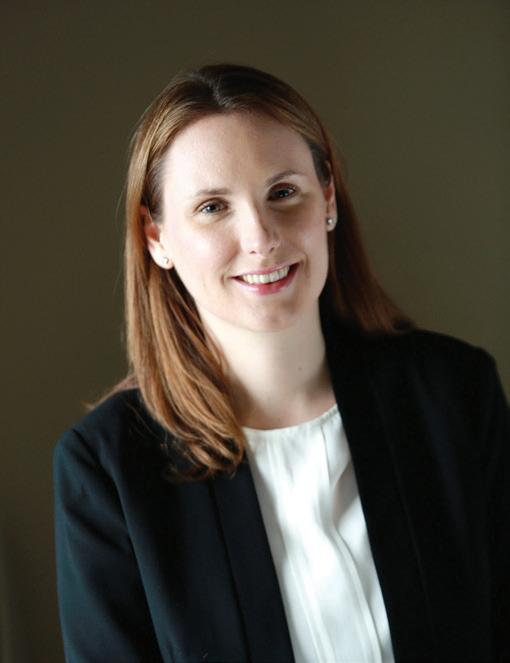
We meet three entrepreneurs from accountancy rms to hear about managing cash ow, the power of technology and putting clients rst. We also give top tips on how to keep your top talent in 2023 and look back at a year of in-person events a er two years of virtual conferences and award ceremonies. Along the way, you will come across a diverse range of businesses, whose experiences may well give you a fresh take on your own venture. is magazine contains stories that inform, inspire and entertain. It showcases and celebrates the achievements of small companies, provides advice to help you in your business and keeps you up to date on the latest trends at home and abroad.
Ireland is a nation of small businesses. Of over 267,000 businesses in the country, 99% have less than 50 employees (small) and 92% have less than 10 (micro). ese companies can be seen in every city, town and village in the country and together they provide employment to half of the private sector workforce. e SFA proudly represents a diverse membership of businesses with less than 50 employees: homegrown and spanning every sector of our economy. Our members can be found in every town and every city in Ireland. We want to make Ireland the most vibrant small business community in the world – an environment that supports entrepreneurship, values small business and rewards risk takers.
Better Business is the magazine of the small business community. We welcome your feedback, suggestions and ideas to info@sfa.ie or on Twitter @SFA_Irl.
 Elizabeth Bowen Acting Director, Small Firms Association
Elizabeth Bowen Acting Director, Small Firms Association



Welcome to Better Business, a magazine dedicated to the small business community.
2022
Big News for Small Business News, views and profiles from SFA members and small businesses in Ireland 14
Sector Spotlight
Sustainability is a key focus for Ireland’s construction sector
The Food Reformulation Taskforce is helping businesses develop healthier products
Cover Story
KTI Manager Imelda Lambkin on the growth of Ireland’s technology transfer industry
32
Entrepreneurs
Three accountancy firms explain why managing cashflow is key in 2023
HR
Employees are entitled to a new public holiday in February 2023
Both the rain and Irish culture are keeping Gerardo Larios Rizo in Dublin
Dublin artist Patrick Cahill reflects on a career spanning more than four decades
A host of events, both in-person and virtual, were held by the SFA in 2022
Circular Economy
Niamh Kelly at Re-turn explains how the new DRS will impact retailers and producers
Health
Financial wellness programmes are key to employee wellbeing, writes Nick Lawlor
Travel
Small firms looking for new export markets should look no further than Poland



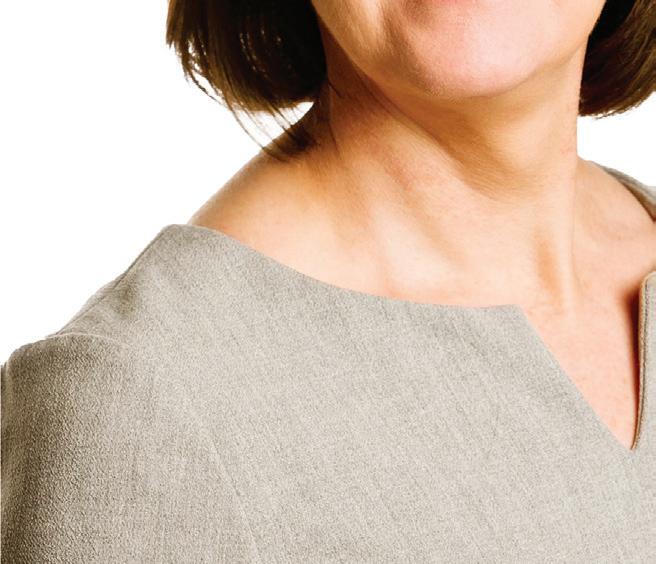

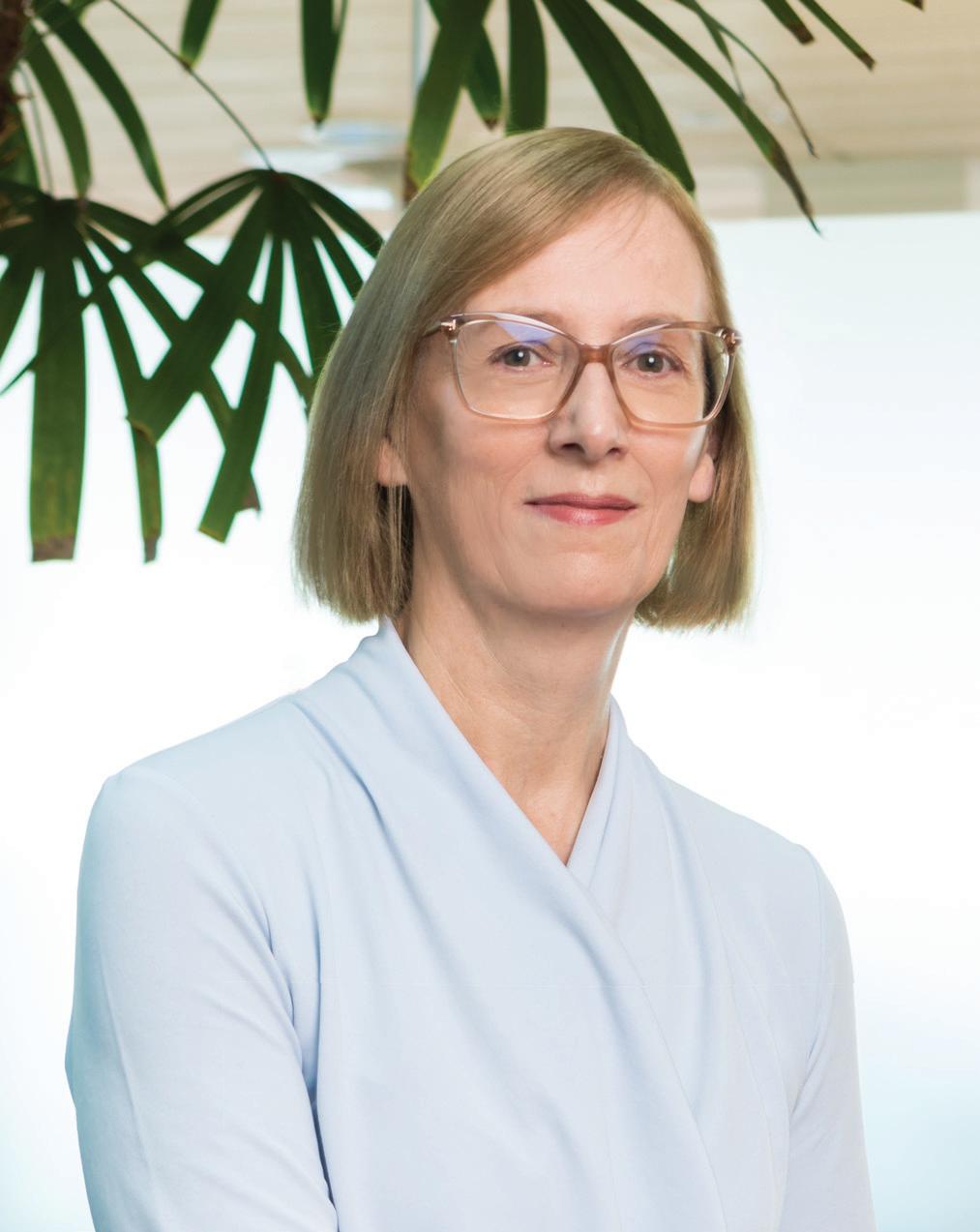

Irish data centre and cloud services company Servecentric has seen further growth in its public cloud offering, Servecentric Enterprise Cloud. Powered by CloudSigma and HPE, revenues at Servecentric Enterprise Cloud have grown by over 250% in the 18 months leading up to November 2022. Servecentric CEO Brian Roe believes that working in closer partnership with more established software suppliers and MSPs has driven this growth. “We have identified that a growing portion of the market wants a simple to use, cost-effective alternative to hyperscale cloud. We have now fully functional, self-service IaaS and PaaS solutions across 18 global partner locations, providing flexibility and scale for our customers.” Formed in 2002 and based in Dublin, Servecentric is an Irish owned company that provides secure data centre colocation, connectivity and public cloud services to a global client base.
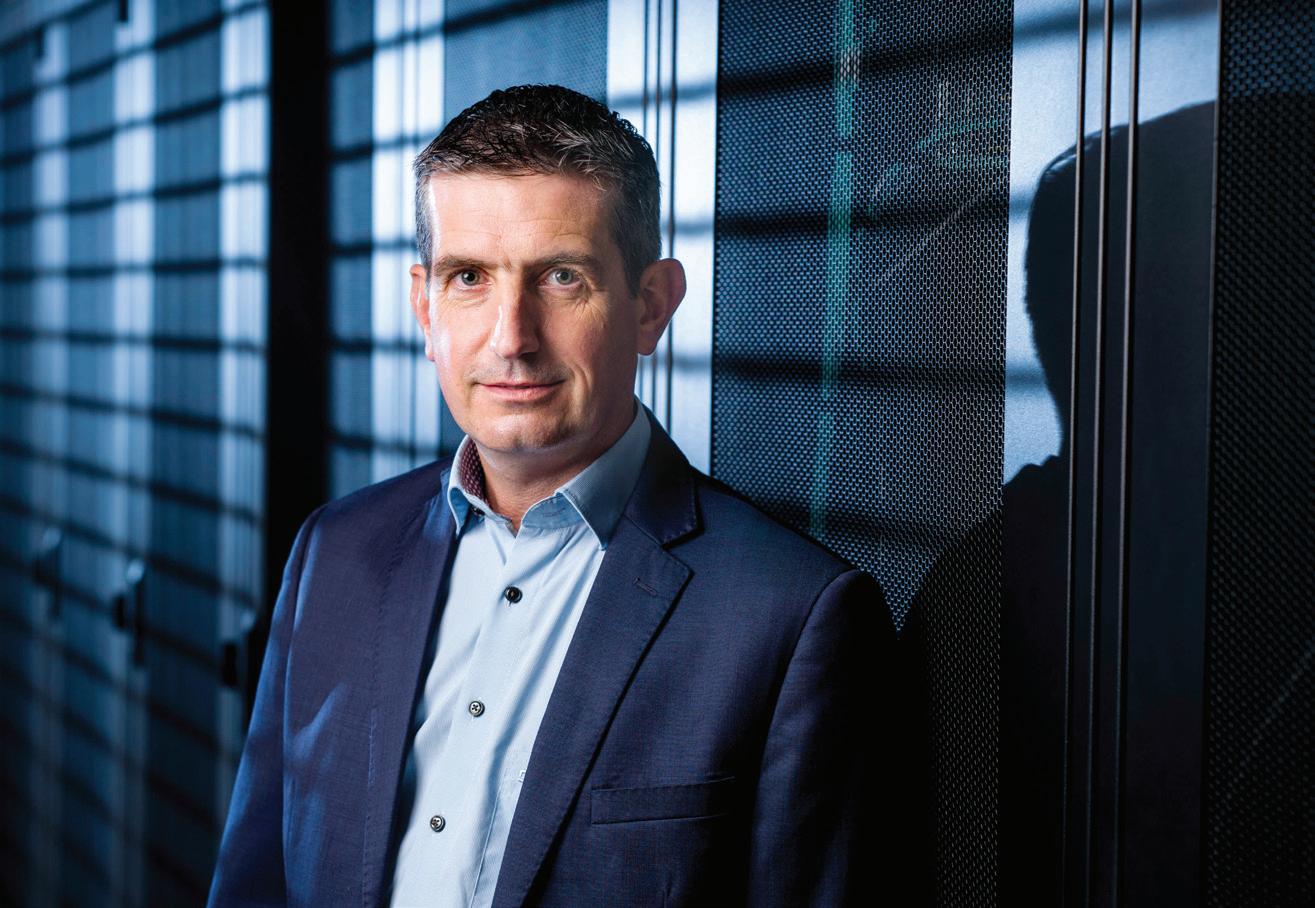
2022 brought extreme energy price impacts on small business, presenting a huge challenge. SEAI provides supports and advice for energy efficiency and renewable energy. Reducing energy demand, improving energy efficiency and using renewable energy will protect small businesses from energy price impacts now and in the future.
To learn about new Government energy supports, financial assistance to install solar PV panels and resources to deliver new energy efficiency projects, visit SEAI.ie
The Small Firms Association is pleased to announce that Geraldine Magnier, Director & Co-Founder of Idiro Analytics, has been elected as its new Chair. The priorities of her tenure will be to support SFA members during this time of economic uncertainty. This will include the implementation of the SFA strategy 2022-2025 “Small Business: Ireland’s Future”, which aims to create a level playing pitch in the business environment and to work with Government and other stakeholders on the delivery of the new Department of Enterprise, Trade and Employment’s White Paper on Enterprise, along with appropriate policy for small firms and family businesses.
Geraldine is Director & CoFounder of Idiro Analytics, a multi award winning company. Idiro is an AI company with an AI Ethics Centre and is a pioneer in advanced analytics, working across multiple sectors. In November 2022, Geraldine was named ‘Technology Ireland Person of the year’ by Technology Ireland, Ibec and has served two terms on the SFA National Council. She was also appointed Vice Chairwoman for the Council in 2021.


The European Commission has announced that two talented and inspiring Irish women entrepreneurs are winners in the EU Prize for Women Innovators 2022. Dr Ciara Clancy, Founder and CEO of Beats Medical, has won in the Women Innovators category while Niamh Donnelly, Co-Founder and CRO of Akara Robotics, won in the Rising Innovators category. The competition celebrates the women responsible for Europe’s most groundbreaking innovations, from tackling climate change to treating the world’s deadliest diseases. This is the second year in a row that Ireland has won in the Rising Innovator category, which recognises promising emerging innovators under the age of 35. Last year, Ireland’s Ailbhe and Izzy Keane of Izzy Wheels won the award and a third of the entrepreneurs nominated for the finals were from Ireland. The competition is funded by the EU’s Horizon Europe programme for research and innovation and managed by the European Innovation Council (EIC) and SMEs Executive Agency (EISMEA).


The SFA is delighted to be a partner organisation for the Skills for Better Business Online Assessment tool, a collaborative project between the Department of Enterprise, Trade and Employment and a number of national business support agencies. The short, self-assessment tool gives business owners direct insights into how to improve their skills and capabilities as an owner-manager of a small to medium-sized business. The free assessment focuses on development priorities, identifies critical areas to focus on for personal growth and business success and the bespoke report highlights the best supports available to tackle your specific needs.
Access this free tool now at skillsforbetterbusiness.gov.ie
IF YOUR BUSINESS HAS SOME NEWS TO SHARE THAT YOU WOULD LIKE FEATURED IN THE NEXT EDITION OF BETTER BUSINESS, CONTACT ELIZABETH BOWEN ON (01) 605 1626 OR ELIZABETH.
BOWEN@SFA.IE
Due to continued growth and expansion, Thermodial has moved head office to Citywest. Just over 21 years since they moved into Centrepoint Business Park, Dublin 12, Thermodial has made the short journey down the N7 to Citywest and Magna Business Park. A long-term lease has been signed on a modern, highquality business unit to satisfy increased space and facility demands. Centrepoint Business Park served Thermodial impeccably well during their tenancy.
Enterprise Ireland provide grant funding up to a maximum of €5,000 to explore a business opportunity or problem with a registered knowledge provider in the areas of sustainability and decarbonisation.

See www.enterprise-ireland.com for more information.
This Toolkit provides practical and cost-effective actions that every business can take to support this transformation and build resilience.
See climatetoolkit4business.gov.ie for more information
For businesses with 10 or fewer employees, the Local Enterprise Office offers two days of intensive mentoring including green transition advice and technical support to a wide range of microenterprises with 10 or fewer employees. Green for Micro is free of charge for eligible enterprises and represents the potential for increased efficiencies within companies that adopt these principles.



“SFA’s MentorsWork new consultancy offering provides hands-on consultancy services focusing on addressing sustainability needs in businesses up to 250 employees in every sector of the economy.”
Elizabethresponse
A new shared kitchen facility at SPADE Enterprise Centre in North King Street, which will provide increased capacity for what is a growing demand from food start-ups, is currently under construction. For more than 35 years, SPADE has nurtured and encouraged a spirit of entrepreneurship in the city and provided flexible work spaces which can grow with businesses as they scale up. The new shared kitchen facility will service the growing demand from food start-ups for affordable and flexible kitchen space and will operate 15 hours per day for 365 days of the year. The shared kitchen model will help start-ups with the high costs of setting up a new food business and thereby prevent early exits from the business. The kitchen will accommodate multiple food producers simultaneously with state-of-the-art kitchen facilities, along with best practice culinary and nutritional education, sectoral events and food cluster initiatives.
“The
to the awards programme is a reminder that Irish small companies are resilient, putting their best foot forward and seeking recognition for their efforts.”
Sue O’Neill, Chair, SFA Awards Judging Panel
“KBC and Ulster Bank small business customers must prioritise switching banking providers and ensure that all new bank accounts are set up correctly, so they can continue to make and receive payments.”
Graham Byrne, SFA Past Chair
Bowen, Acting SFA Director
Dingle Sea Safari
@DingleSea Delighted to feature in this weeks
@InBusinessRK chatting about being a finalist in the @SFA_Irl National Business Awards for 2023!
Sharon Bannerton
@sharonbannerton
‘If we want local businesses to reopen in January, now is the time to stay loyal

@ChampionGreenie, @SFA_Irl, #supportlocal
@WMBMagazine
The Small Firms Association (@SFA_Irl) recently announced that Geraldine Magnier, Director & Co-founder of @idiro_analytics, has been elected as its new Chair. Geraldine is Director & Co-founder of Idiro #Analytics, a multi award winning company. #STEM

The Small Firms Association has launched a Motor Savings Scheme, exclusively for members, to enable motor cost-saving opportunities.
With increased fuel costs, a changing insurance landscape and climate risk, it’s not surprising the SFA 2022 Motoring Cost Survey found that 81% of SFA members rated “reducing fuel costs/CO2” and 76% considered “cost of motor insurance” as “very important”.
The SFA Motor Savings Scheme is a unique onestop-shop for SMEs with cars or vans to sustainably reduce motoring costs, to the tune of €1,000 per vehicle, per annum.
Many businesses don’t measure the full cost burden of driving for work or realise how “bad costs” can be avoided. While it’s not always possible for a business to reduce mileage or change vehicles, the good news is that an improvement in average driving style can deliver multiple benefits.
The SFA Motor Savings Scheme works by delivering zero or low-cost, data-driven insights, which will enable members to control insurance, fuel and other motoring costs. The Scheme is supported bv leading partners including Zurich Insurance, Circle K and DriverFocus

ROCTEL @RocTel
Such an important initiative @SFA_Irl education is as important as prevention and protection
#CyberSecurity
#CYBERDEFENCE #ThinkB4UClick
A conservative estimate of fuel savings per 10 cars or light commercial vehicles is €3,000 per annum. DriverFocus analysis also outlines how eco driving returns similar savings in both running costs and avoidance of uninsured losses, saving businesses on average, €1,000 per vehicle per annum.
LearnmoreabouttheSFAMotorSavingsScheme at SFA.ie/motorsavings
Just 14% of Irish Small Medium Enterprises (SMEs) plan to increase investment in sustainability practices and solutions such as water conservation, energy conservation and recycling in the next 12 months due to rising costs pressures, according to a new survey of SME attitudes to conservation and sustainability, developed by Irish Water in partnership with the Small Firms Association.


To support the challenges being faced by small businesses in water conservation, Irish Water has developed a suite of easyto-access and free initiatives to help SMEs reduce costs and become more sustainable. Their first-of-its-kind globally Water Stewardship Programme is a comprehensive training programme which helps organisations lower their water use, thereby reducing operating costs and protecting the environment.
Its Annual Certification Scheme enables any company showing commitment to water stewardship to join an awardwinning network of leading firms across Ireland with access to training events, research opportunities and best practice tools in water stewardship.
To learn more, visit water.ie




will be the fourth year of the award-winning MentorsWork Programme. Over 2,000 Irish SMEs have completed the 12-week business development programme that focuses on upskilling business owners to prepare them for the ever-evolving business climate.
e Government-backed initiative launched by Minister Simon Harris was created to support Irish businesses and boost productivity levels to ensure they remain competitive. MentorsWork attributes its success to giving SMEs and sole traders the ability to tailor the mentoring programme to suit their speci c needs, as well as encouraging the owner/ manager and the management team in the business to receive mentoring.
Managing a business can be di cult with a wide range of challenges to navigate, so ensuring you have the right skills and tools to survive is a critical process. Having a person that is an expert in the speci c area that your business needs improvement on or someone with over 20 years of industry experience to guide you in the right direction, is an invaluable opportunity for business owners and team leaders.
is years’ MentorsWork programme will speci cally address supporting SMEs to navigate the challenges within their current operating environments including operating cost increases, price in ation, recruitment and retention challenges, cybersecurity threats and overall corporate governance. ere is a particular focus on an additional strand to the programme in the Green economy. Sustainability and ESG have risen rapidly up the corporate agenda over the last few years and MentorsWork is providing support to SMEs through training sessions, mentoring and guidance on how Irish businesses can keep up to speed.
Every new cycle of MentorsWork has been carefully developed to adapt and fit to the ongoing and changing needs of SMEs across Ireland. The new consultancy service within MentorsWork, launched in 2022, allows participants who have completed the programme to apply for hands-on consultancy services focused on addressing SMEs’ digital and sustainability needs.
Sue O’Neill of Shellcove Association Management Company, a MentorsWork alumni, said: “MentorsWork really helps you along a journey of looking at technology, looking at systems, looking at processes that you have in place and improving your productivity.”

MentorsWork is delivered by the Small Firms Association (SFA) in partnership with Skillnet Ireland. Launched in 2020, it is a nationwide upskilling scheme to help boost SME productivity levels, using one-to-one mentoring sessions, peerfocused workshops, expert-led masterclasses and an online learning platform with practical business tools.















































NUALA COLLINS IS LEADING THE FOOD REFORMULATION TASKFORCE, AIMED AT HELPING FOOD BUSINESSES REDUCE CALORIES, SATURATED FAT, SUGAR AND SALT IN THEIR PRODUCTS
the Department of Health announced the establishment of a Food Reformulation Task Force to implement the ‘Reformulation Roadmap’, a plan that aims to reduce calories, saturated fat, sugar and salt in the Irish diet. The initiative has been developed by the Obesity Policy Implementation Oversight Group (OPIOG), who are charged with delivering the Government’s commitment to combat obesity. Over a four year period, food companies are being asked to use less of these target nutrients in many everyday foods and heading up the initiative is the Food Reformulation Taskforce, led by Nuala Collins at the FSAI.

“Obesity is a complex issue, with several different elements associated with the disease. As part of their obesity policy and action plan, the OPIOG has indicated that food reformulation is a fundamental part of that plan. The purpose of the Food Reformulation Taskforce is to encourage food businesses of all sizes to reformulate their foods, with a focus on reducing sugar, saturated fat, salt and calories. We’re on hand to help businesses understand how the targets apply to their portfolio.”
Researchers at UCD have investigated the types of processed pre-packaged foods and drinks that contribute most to calories, sugar, saturated fat and salt. “These are the food types that are targeted for food reformulation. It’s about making them healthier. Over the past 10 years, food reformulation has been introduced in several European countries so I think a good proportion of food manufacturers
Salt
10% reduction focused on the food groups that contribute most to people’s salt intakes
Sugar A 20% reduction is proposed in the sugar content of foods that contribute most to sugar intakes
Saturated Fat A 10% reduction in the saturated fat content of processed foods that contribute most to saturated fat intakes in Ireland is proposed
Energy (Calories) A 20% reduction in calories is proposed, focused on product categories that contribute significantly to children’s calorie intakes
targeted explicitly at babies and young children. The FSAI will develop targets for this category based on its previous work in this area (2012 and 2018).
are already on that journey.” The message that food reformulation is a necessary step towards improving the Irish diet is one that’s intended for everyone – food manufacturers, retailers, out of home catering businesses, delis, takeaways, restaurants and catering services in the workplace. “The message is also across the entire portfolio of products available in Ireland. When it comes to products like chocolate bars, it may not always be possible to completely reduce the levels of these nutrients that we’re talking about without changing the nature of the product. That’s when portion size reduction comes into play; we are encouraging voluntary portion size reduction where reformulation may not be possible.”
The FSAI website features detailed, extensive advice for businesses on the targets to reduce calories, sugar, saturated fat and salt in particular food categories. Forty priority food categories have been identified by the Taskforce, again based on research conducted at UCD. “Food reformulation is really something that all companies need to be putting on their agenda. A commitment to reformulation over the next number of years needs to be incorporated into business plans and I think companies should also be forming teams to execute the reformulation process.” A recent workshop led by the Taskforce showcased four food businesses that have already embarked on reformulation. “There are definitely companies out there that have exceeded their targets for reducing salt, sugar and saturated fat. That can-do attitude was very prevalent at our recently held workshop, where one company presented a 64% sugar
reduction in a sugar sweetened beverage. The target is 20%. Another company presented a 36% saturated fat reduction in a coffee drink, when the target is 10%. In addition, another company managed to reduce the amount of salt in their processed meat product by 16%, when the target was 10%.” Workshops and webinars organised by the Taskforce are useful when it comes to the sharing of information. “We’re here to support businesses and encourage them to learn from companies that have already started out on the reformulation process. Connecting people and sharing experiences are really helpful for companies that are at the early stages of introducing reformulated products.” Over time, the Taskforce will also be publishing case studies demonstrating how companies are succeeding in this space.
Currently, the Reformulation Roadmap is a voluntary initiative. The monitoring aspect of the Roadmap is, says Nuala, essential in terms of understanding the progress that’s being made. “We want to avoid any need for legislation or fiscal measures to drive reformulation and so far, we’re encouraged that food companies are making a real effort to engage with the process. No doubt there will be some companies that may experience technical difficulties or issues, but we at the Taskforce are on hand to support any food businesses that may be facing challenges. We’re very positive about this initiative and we believe it will be successful. It’s an incredible opportunity to influence public health and too important not to succeed.”
For more information on the Reformulation Roadmap, go to https://www.fsai.ie/food_ businesses/reformulation.html


On the 9th of March, the SFA brought together over 200 small and large businesses virtually for our annual Business Connect conference, hosted by Richard Curran. This annual marketplace event provides a platform for small businesses to learn how they can win contracts with larger companies and how to position themselves correctly to deliver value.
The first session of the day was ‘The Green Economy –sustainability challenges and opportunities for business’ with BarbaraAnne Richardson, Public Affairs Lead for CSR & Sustainability at Heineken, with a panel discussion from Fergal O’Brien, Director Lobbying and Influence, Ibec; Caroline Ashe, Director, KORE Systems; and Errol Close, Head of Strategy and Sustainability, Eirgrid. At our ‘Future of Work – managing you talent in the new hybrid workplace’ session, we heard from Peter Cosgrove of Futurewise and for the final session of the day, we explored ‘The Retail Phenomenon – learnings from successful business transformation’ with keynote speaker Bobby Kerr, Broadcaster and Chairman of Insomnia Coffee. Bobby was joined by a panel discussion with Siobhéal Nic Eochaidh, MD, Rosie & Dott; Jill Holtz, Co-Founder, mykidstime.com; and Brigitta Hedin-Curtin, MD, Burren Smokehouse.
As well as plenty of networking opportunities available on the day, delegates got to see the best in small business from the SFA National Small Business Awards 2022 who exhibited along with awards sponsors and partners.



IN-PERSON EVENTS WERE BACK WITH A BANG AT THE SFA IN 2022. HERE’S A LOOK BACK AT SOME OF THE INCREDIBLE EVENTS, BOTH IN-PERSON AND VIRTUAL, THAT WERE HELD THROUGHOUT THE YEAR


After two years of hosting the SFA Awards virtually, the 18th annual SFA National Small Business Awards Gala took place at the RDS in-person once again. Celebrating the best small businesses in Ireland, Aalto Bio Reagents was announced as the overall winner, along with the other nine category winners. A full list of 2022 winners can be found at www.SFAAwards.ie
In September, we launched the 19th annual SFA National Small Business Awards with the help of An Taoiseach Micheál Martin at Government Buildings. We are delighted to announce our finalists for the 2022 Awards programme and you can find the full list of companies on www.SFAAwards.ie
At our B2B event, members had the opportunity to learn from each other and hear from those who have expertise in saving costs and managing the bottom line. Tony Dignam of the Agile Executive provided practical insights for companies on managing their business in inflationary times, highlighting where cost savings can be made and also where strategic investment can help to improve productivity and help to manage the bottom line. We were also joined by Caroline Ashe of KORE Insulation, Philip Noone of Aalto Bio Reagents and Shirley O’Kelly of Timbertrove on ‘Tips from Award Winning Businesses’.
The SFA Christmas Evening is a casual networking event and we were delighted to have Samantha Kelly join us as keynote speaker. Samantha, also known as the ‘Tweeting Goddess’, is an award-winning Twitter expert, social media strategist, speaker, author and founder of the Women’s Inspire Network, who enlightened our guests with tips on how small firms can use email, social media platforms and other digital tools to market, network and grow their businesses in 2023.
DATES FOR YOUR DIARY 2023
n 8 February
Business Connect, Aviva Stadium

n 9 March
SFA National Small Business Awards Gala
n Early September
Launch of the SFA National Small Business Awards 2023



n Early November SFA Annual Lunch
n 7 December
SFA Christmas Members Evening
After a two-year hiatus, the SFA Annual Lunch returned to the Mansion House on 11 November. Our keynote speaker this year was the legendary Henry Shefflin, affectionately known in Kilkenny as ‘King Henry’, the former Kilkenny player who is also the current manager of the Galway senior hurling team. In his playing career, Henry was nicknamed King Henry because of his directive style, dominance, competitive spirit and leadership on the field.
Thanks to all of the virtual platforms available, we have been able to continue to host a great deal of educational webinars, such as our Employment Law Autumn Training Series and other partnered webinars.
Make sure you keep an eye on our schedule of SFA events at www.sfa.ie/events and keep up with us on Twitter @SFA_Irl


the then Minister for Public Expenditure and Reform, Michael McGrath, published the ‘Build 2022: Construction Sector Performance and Capacity’ report. The report outlined that “an efficient, productive and sustainable construction sector is essential to deliver the increased ambition set out in the National Development Plan 2021 – 2030.” Making Ireland’s construction sector sustainable is a key element of Build 2022 and one in which Construction Sector Group (CSG) Chairman PJ Rudden is invested in.

The CSG was established in 2018 to aid the successful delivery of the National Development Plan (NDP) and also to consider wider developments in the construction sector. Well-known industry stalwart PJ Rudden of Aengus Consulting is heading up the Group. There are, he says, seven priority actions that need to be taken in order for the construction industry to meet the targets set out in the NDP, as highlighted in a Government commissioned report by KPMG in 2020. The first and second points centre around research and finding ways to build more efficiently. “The KPMG report looked at productivity rates amongst construction workers globally and found that Ireland ranked lowest. Our reluctance to adopt digitalisation is a key reason for that poor ranking. If we’re still using rubbers and pencils and building on drawing boards, how can we evolve as an industry? The use of BIM (Building Information Modelling) and other technologies is increasing all the time, but funding for research into how we can fulfil our tech potential is crucial.”
The third action required by industry is to speed up its use of MMC (Modern Methods of Construction). With a chronic shortage

“AS A COUNTRY, WE WERE CRAWLING AND NOW WE HAVE TO RUN WITHOUT GOING THROUGH THE TODDLER STAGE, WHICH IS VERY DIFFICULT TO DO. BUT WE’RE DOING IT AND I THINK THAT PROVES WE HAVE THE CAPABILITIES TO CREATE A MODERN, EFFICIENT, HIGH FUNCTIONING CONSTRUCTION INDUSTRY. WE JUST NEED ALL THE STAKEHOLDERS INVOLVED TO GET ON BOARD.”PJ Rudden, Chairman, Construction Sector Group (CSG)
of skilled construction workers in Ireland, increasing the use of modular buildings will go some way towards resolving that issue. “That doesn’t mean that MMC requires less workers. We actually need to double the numbers working in the industry and we need to attract more women to the sector. As modular construction continues to grow, skilled workers will be required for off-site factories, with far fewer people needed on site.”
The fourth priority action is to develop a Construction Skillnet, something that was achieved in 2020. Action five is to digitise the planning permission application system, which is well on its way on a county by county basis while action six is to drive the use of BIM across all facets of the industry. Since the KPMG report was published, half of the priority actions set out have already been delivered. “As a country, we were crawling and now we have to run without going through the toddler stage, which is very difficult to do. But we’re doing it and I think that proves we have the capabilities to create a modern, efficient, high functioning construction industry. We just need all the stakeholders involved to get on board.”
The final action called for the establishment of a construction technology centre to make Ireland a global leader for sustainable construction and built environment technology. In December 2022 Construct Innovate, a new Enterprise Ireland Technology Centre hosted at University of Galway, was officially launched. With funding of €5 million over five years, the Centre will accelerate research and innovation in the construction sector and put the built environment industry at the cutting-edge of developments by utilising the strengths of a network of government, industry and academia. Dr Magdalena Hajdukiewicz, University of Galway academic, is the Director at the new centre. “The vast majority of firms working in the construction industry are small or even micro enterprises. Almost 93% of companies employ less than six people and approximately 99% employ less than 50 people. Quite often, these small companies do not have the resources to commit to research and innovation. That’s where we come in.”

Construct Innovate will connect construction firms with world class experts in specific areas, depending on the type
of research they’re interested in. Most of the centre’s core funding will go towards the appointment of innovation researchers, who will work with companies to help them identify and address their key challenges. One major challenge facing the industry is the requirement to deliver 33,000 houses every year until 2030. “That’s a huge target and one we won’t hit if we continue to use traditional building methods. We need to start looking at MMC and the process of manufacturing off-site and then delivering prefabricated units to site. In order to achieve that we must develop new building products, but these building products must be certified to ensure they’re safe for use.” Limited access to testing facilities means it can be a challenge to ensure certification for new products is achieved. “We offer access to some of Ireland’s most advanced research and innovation infrastructure, which will go a long way to solving this problem. We also provide firms with access to the METABUILDING Open Innovation Platform, which gives companies technical support and/or access to services, test-beds and demo buildings across Europe.”
Construction firms are being encouraged to become a member of Construct Innovate. Membership is available on two levels – associate member and patron member.
IT’S FANTASTIC THAT WE NOW HAVE A ONE STOP SHOP WHERE THE INDUSTRY CAN COME FOR SUPPORT TO ADVANCE THEIR R&D JOURNEY.Joe Healy, Enterprise Ireland; Professor Ciarán Ó hÓgartaigh, President, University of Galway; Dr Magdalena Hajdukiewicz, University of Galway and Construct Innovate; An Taoiseach Leo Varadkar; and Prof Jamie Goggins, University of Galway and Construct Innovate
“We want the centre to be available to all stakeholders who are interested in developing R&D expertise, so the entry point to associate membership is quite low. It is also aligned with membership of the Irish Green Building Council, so anyone who’s a member of the IGBC can become a member of Construct Innovate at no additional cost.” Construct Innovate will only work if it addresses the challenges facing the industry. “It’s not about academics doing the research that we think might be right. It’s about industry identifying the challenges and working with us to address those challenges. Within Construct Innovate, we will have working groups identifying the projects that should receive funding –that’s how research will be conducted. Engagement from industry is crucial. We’re here to empower companies to take ownership of their research and innovation. This centre should have existed 20 years ago, but it’s fantastic that we now have a one stop shop where the industry can come for advice and support to advance their R&D journey.”
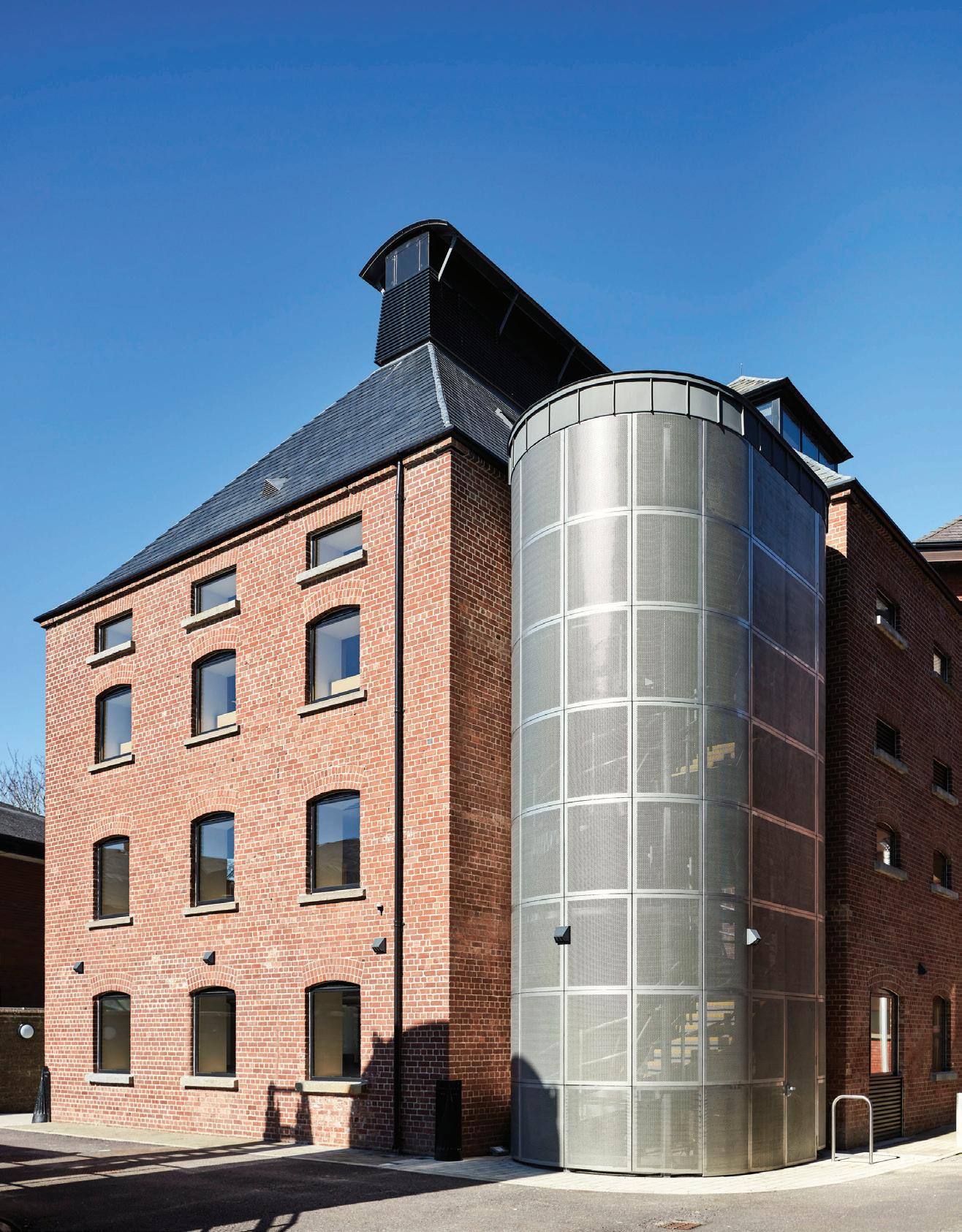
A lack of skills within construction has been well documented. It’s an issue that’s affecting firms across all sub sectors of the industry and one of the main challenges facing JODA Engineering Consultants in Cork. “We’re a small company and at the moment, we have openings for two to three engineers, from senior down to junior level. This lack of skilled staff is on the back of the 2008 recession where we saw a 50% reduction in engineering graduates. We’re seeing the results of that now, with the lack of intermediate
and senior engineers within the industry. Everyone is competing for the same small pool of people,” said Anthony Lynam, Director at JODA. Currently, there are just two dedicated building services courses in Ireland. “Even outside the construction sector, there are a lot of industries looking for that type of expertise. It’s definitely one of the areas that’s hampering our growth.”
The rising cost of doing business is another difficulty to contend with. “Costs have gone up across the board. Just taking insurance as an example, first of all you’d be lucky to even get adequate insurance. It’s not just a matter of picking up the phone anymore and getting covered. Since 2019, our insurance costs have increased by 240%. Combine that with inflation, utility bills and rent and you’re looking at a very serious situation.” With inflation at 8%, clients are understandably reluctant to spend money right now. “If people have finance and a fixed budget going into 2023, we’re finding that they’re likely to scale back on projects to suit the funding that’s available.”
Despite the current headwinds, Anthony is optimistic about 2023. Although the engineering consultancy may be somewhat limited in the amount of work it can take on, there’s plenty of jobs in the pipeline. “Staff availability is an issue, but I see a lot of work coming down the line, particularly in the education sector where we’re anticipating significant spend. Over the next few years, I think we’ll also see a demand for energy retrofits to existing buildings in order to meet the 2030 carbon reduction targets. That’s only seven years away, so there’s a lot of work to be done in the meantime.”
“WITH INSURANCE, IT’S NOT JUST A MATTER OF PICKING UP THE PHONE ANYMORE AND GETTING COVERED. SINCE 2019, OUR INSURANCE COSTS HAVE INCREASED BY 240%. COMBINE THAT WITH INFLATION, UTILITY BILLS AND RENT AND YOU’RE LOOKING AT A VERY SERIOUS SITUATION.”Tyndall Kiln Building, Cork JODA Engineering Consultants





































Despite reports of layo s and redundancies, Ireland’s digital industry is very much open for business. Digital recruitment rm Connexus is seeing a client base looking to grow and expand their business and a workforce eager to consider their options. “We don’t deal with the dominant global employers so we’re not impacted by those unfortunate stories about redundancies. From a hiring perspective, the outlook in the digital space is very positive. I think it’s important to remember that Ireland’s economy isn’t just about FDI organisations; it’s about ambitious small to medium sized companies that are actively looking to recruit high performing talent,” said Graham Morris, Founder of Connexus Recruit.
Graham set up Connexus Recruit in 2016. “I felt there was a gap in the market for a recruitment rm that was focused speci cally on digital. Connexus is all about supporting organisations from a talent perspective on their digital transformation journey. It’s quite a unique o ering.” Based in Dublin, Connexus provides services on an all-Ireland basis and also operates in Berlin and Amsterdam. e company’s service o ering is split into four pillars – marketing, creative UX/UI, data & analytics and commerce & product. is year in particular, sentiment is playing a key role as to whether an employee decides to ‘stick or twist’. “Covid had an impact on whether an employee opted to stick with

their current employer or twist and consider another position with an alternative employer. at sentiment has shi ed and employees are deciding not to allow external events dictate their career path. Applicants are very much open to considering options if they’re presented in a profound and meaningful way.”


Clients at Connexus tend to be high growth start-ups or challenger brands. Ireland’s digital talent pool to service these companies is healthy but there is a talent shortage within certain areas, says Graham. “ ere’s a huge demand for social media strategy roles at the moment, but very little supply. If an individual has any form of social media strategy experience and has worked for any large, meaningful brands, now’s the time to be on the market. is year, we also saw a demand for E-commerce and product positions as an increasing number of organisations either went through their own digital transformations or went online in a more tangible and meaningful way. We see that trend continuing into 2023.”
Dublin is still considered a great place to work, says Graham. “ e vast majority of organisations that we’re working with have implemented hybrid working models. So whilst an employer may have a premises in Dublin, that doesn’t mean you must live in Dublin to work for that employer.” Dialogue between employers and employees around appropriate working models is increasing.
“Conversations are being had around what hybrid actually means. e number one priority for employees is exibility. ey don’t necessarily want to be fully remote or in the o ce full-time, but having exibility while still retaining human interaction is key.”
Over the next few years, Connexus intends to expand further into the technology space from a recruitment and selection perspective. “We also intend to continue our expansion into European markets including Germany and Holland. We’re also actively exploring opportunities in the US east coast.”
"I THINK IT’S IMPORTANT TO REMEMBER THAT IRELAND’S ECONOMY ISN’T JUST ABOUT FDI ORGANISATIONS; IT’S ABOUT AMBITIOUS SMALL TO MEDIUM SIZED COMPANIES THAT ARE ACTIVELY LOOKING TO RECRUIT HIGH PERFORMING TALENT”


Richard Branson once said, “Take care of your employees and they will take care of your business”. The key to engaging your customers is to engage your workforce. An employee that’s truly engaged is one that has an emotional investment in the company. Taking an employee view of the workplace and sometimes letting workers steer their own ship will go a long way towards improving morale.

Take time to build your brand identity. This will feed into all your marketing and communications.
Identifying your strengths and understanding your target customer will ensure you don’t waste time trying to be everything to everyone. Your website and social media channels and any advertising and PR should be aligned and consistent with this, helping to tell your story in a very clear and effective way.
Service and delivery are the most important part of any business. Don’t promise what you can’t deliver and don’t overpromise. It could be as simple as returning an email or a telephone call – keep your clients informed, set the standard and you’ll find that others will follow.
There are many definitions, but there’s one thing that all great business leaders agree on, and that’s how success can only come by persevering despite failure.
Pat Davitt
The Institute of Professional Auctioneers and Valuers
 Cora Barnes MD, Three Q Perms & Temps Recruitment Agency
Cora Barnes MD, Three Q Perms & Temps Recruitment Agency


Everything begins and ends with your ability to deliver quality, whether that’s quality in a product or service experience. Quality drives the value of our business. A team can only be proud and get behind a quality business. Commitment to delivering that quality time and time again keeps a business on track.
Neil Mullaney Sales Director, The Agile Executive

Involve your staff. Before you make decisions, get feedback from the people that work with you and get them engaged in the business. It’s impossible to think of everything yourself, so don’t try. Also, it’s important to hold weekly sales meetings to ensure accountability amongst the team. Lead by example – you need to be accountable to the team too.
Sometimes entrepreneurs lose sight of why they’re putting in those long hours. There must be a financial reward to go with the hard work. First, pay yourself an income before anyone else, then pay some of it to your future self. Insurance is also essential; get good advice from a professional and check in at least once a year to make sure you’re on track.
“Once you face your fear, nothing is ever as hard as you think”








































































 Paul McCarthy
Paul McCarthy






“THROUGHOUT THE PANDEMIC, RESEARCH SHOWED THAT A LARGE PROPORTION OF COMPANIES KEPT UP THEIR R&D ACTIVITY; THEY VIEWED IT AS VITAL TO CONTINUED GROWTH AND I THINK THAT VIEW PERSISTS IN THE POSTCOVID ENVIRONMENT WE’RE IN TODAY.”Imelda Lambkin, Manager, Knowledge Transfer Ireland (KTI)
Knowledge Transfer Ireland (KTI) aims to make it more simple and straightforward for companies to tap into research within Ireland’s publicly funded system. Small business in particular can benefit hugely from engaging with KTI and creating alliances and partnerships with universities across the country, or other research-based institutions. There’s a wealth of information, knowledge and talent out there which can, says KTI Manager Imelda Lambkin, prove a valuable asset for small firms aiming to build out their R&D capacity.
When it comes to the success of companies accessing valuable resources within Ireland’s research system, the numbers speak for themselves. The most recent KTI survey showed that in 2021, a total of 2678 new R&D or consultancy agreements were made. Just over €672 million was invested in publicly funded research expenditure. “In the same year, we saw 106 new patent applications filed, 20 new products and services launched and a number of new spinout companies coming out of the system. We keep a close eye on the number of spinouts that remain active three years after setting up and in 2021, we saw that 143 of these spinout companies accounted for 1218 jobs. At KTI, we attract all types of companies, from start-ups right through to large multinational corporations that want to boost their R&D profile and grow within their market,” said Imelda.
As a nation, Covid lockdowns forced us to engage more with our immediate locality. At KTI, businesses are encouraged to investigate the resources available to them through the public research system, right on their doorstep and further afield. “As well as local research facilities, companies can access systems right across the country. Throughout the pandemic, research showed that a large proportion of companies kept up their R&D activity; they viewed it as vital to continued growth and I think that view persists in the post-Covid environment we’re in today.”
For small firms in particular, the benefits of partnering with research centres are wide-ranging. They can garner unrivalled expertise from either individual researchers or from research teams within dedicated centres – there’s no end of options available to firms eager to extend their R&D capabilities. “Some companies will be interested in a very particular field
of expertise, which they may find difficult to access elsewhere. Others will be looking for ways to improve their business processes or develop new products or new technologies, for example. Quite often, researchers have specialised equipment in their labs which companies can access. For smaller firms

that
“WE WORK WITH SO MANY RESEARCH-BASED INSTITUTIONS AND ORGANISATIONS ACROSS IRELAND AND I’M ALWAYS AMAZED AT THE LEVEL OF EXPERTISE AND KNOWLEDGE THAT EXISTS WITHIN THIS SECTOR.”Paul McCarthy Imelda Lambkin,
Manager, Knowledge Transfer Ireland (KTI)
perhaps don’t yet want to invest in costly equipment, that could prove invaluable.” Ireland’s vibrant public research system has made KTI’s job that bit easier. “We work with so many research-based institutions and organisations across Ireland and I’m always amazed at the level of expertise and knowledge that exists within this sector. Alongside the universities, colleges and research-based individual facilities, we also engage with research and tech centres funded by Enterprise Ireland, IDA Ireland and Science Foundation Ireland, to mention just a few.”
KTI’s aim, says Imelda, is to position businesses to be more competitive. “Companies that want to expand into global markets will gain an advantage by boosting the R&D side of their business. We’ve also seen companies benefit in other ways, such as improving their operations, bringing new products to market etc.” A number of these companies will, says Imelda, grow to become high potential startups, with a firm eye on the exports market. “These are companies with an aspiration to grow their employment and to grow their exports. We have seen a number of companies like these. Also, it’s been proven that companies that carry out R&D perform better than those that don’t. Even for firms that don’t have that export ambition, engaging in R&D will help to drive growth and overall performance.”
As Ireland’s research industry is evolving and maturing, so too is KTI. In 2023, the national body is moving onto the next generation of the funding programme it runs to help faciliate academic research and business working together, called KT Boost. “That change is really about adapting to a maturing technology transfer system and ensuring we meet the needs of Ireland’s research facilities, which have changed so much in recent years. We’re also committed to helping companies that may be apprehensive about embarking on their R&D journey.” Engaging with KTI couldn’t be easier. The starting point for most firms is KTI’s website, where you’ll learn what Ireland’s research system has to offer, what funding supports are available and how best to work with the public research system. “Our role is very much to take the pain out of the process, to demystify it so that companies don’t feel like they’re bogged down in technicalities. For a firm
that hasn’t previously had any interaction with, for example, a technological university, they can sometimes find it difficult to know where to start. The website is the first port of call, where firms can also take a look at examples of other companies that have already gone through the process. That’s really helpful as it makes people think, I can do that too.” KTI also points companies towards their local technology transfer office. “Once firms begin their R&D journey, we put them in contact with the technology transfer team in their local college or technological university. That gets the ball rolling quite quickly.”
Held in early December, KTI’s annual Impact Awards celebrate the work of Technology Transfer teams in research institutions across the country. This year, three awards were up for grabs – Commercialisation, Industry Engagement and the Future Forward Award. Trinity College Dublin and SilverCloud Health scooped the Commercialisation Impact Award, while University College Dublin and PlasmaBound won this year’s Future Forward Award. Teagasc, Independent Milk Laboratories, FBA Laboratories and Kerry Group secured the Industry Engagement Award. “The quality of collaboration between businesses and publiclyfunded research is improving every single year and the calibre of award entries in 2022 reflects that. It’s so important to pay credit to the work of the technology transfer offices around the country, who provide that vital link that allows us to deliver meaningful outcomes to society.”
Irish research performing organisations such as universities, institutes of technology and other publicly funded institutions, are spending upwards of half a billion euro on research expenditure every year. 2021’s figure of €672 million is the highest on record and it’s expected that figure will keep on rising. As the industry continues to grow and evolve, KTI is committed to Ireland’s technology transfer system. “I think our progression to KT Boost, which is a four-year strengthening initiative, reflects our commitment to connecting businesses of all sizes to publicly funded research opportunities. We’re all about sustainable, continual growth and through that growth, we’ll continue to help small business grow, develop and expand.”
“I THINK OUR PROGRESSION TO KT BOOST, WHICH IS A FOURYEAR STRENGTHENING INITIATIVE, REFLECTS OUR COMMITMENT TO CONNECTING BUSINESSES OF ALL SIZES TO PUBLICLY FUNDED RESEARCH OPPORTUNITIES. WE’RE ALL ABOUT SUSTAINABLE, CONTINUAL GROWTH AND THROUGH THAT GROWTH, WE’LL CONTINUE TO HELP SMALL BUSINESS GROW, DEVELOP AND EXPAND. ”Fredericka Sheppard, Joint Managing Director, Voltedge Management

A priority for all businesses right now is the retention of key talent, especially at a time when we are navigating so many uncertain economic and global conditions. All sectors are feeling the impact of talent shortages, which is driving the need for better recruitment processes and retention practices. Having access to a talent pool to support growth plans or simply to backfill the demands of flexible working practices isn’t a reality for many. We know the pain and cost of losing talent and the significant financial impact it has on our businesses, not to mention the loss of specialised skills, organisational knowledge and the impact on morale.
When it comes to increasing engagement and happiness levels with our staff, there are three basic principles we need to get right. Our employees need:
To feel like they matter
Do work that has an impact Be supported to grow and progress
Here are a few simple tips that will make a difference:
Invest in relationships with your employees. That doesn’t mean you need to be best friends. It means being authentic and real.
Make time for regular and meaningful check-ins. Don’t just talk about the day to day work, enquire how they are getting on, how you can support them. Work together to make the progress needed.
Use as many channels and forums as possible for regular, brief communication of important information. Share the priorities of the business, celebrate the successes, announce new developments and don’t allow important company information to be circulated third hand.
Establish structured ways to reward and recognise the correct behaviours and outcomes you need. A simple ‘Thank You’ is as valuable as always, it just needs to be said with sincerity.
Earn the reputation of making fair and reasonable decisions on all aspects of work.
Bring your values to life and demonstrate them in everything that you do. We all want to work in an environment where we are respected and feel included.
If employees feel supported and that they matter, especially at stressful times when they are juggling varying demands, they will return this in loyalty and pride in their work.
Investing in the development of your people so that they can participate in meaningful work is really important. This will set them up to perform at their best and continue to grow.
As a leader, show you are human and are not afraid to say when you are wrong. Listen to the voices of your employees and trust them.
Right now, employees want to work for a good social citizen and ethical business that cares about the community and the environment.
Years of research into human behaviour has shown that people have two overarching goals in life: happiness and meaning. For 2023, let’s reflect on the fact that we spend a significant part of our lives working, so the jobs we do should provide us with satisfaction and purpose. In turn, this will impact on how happy and meaningful our lives are, which helps inform our decisions about our workplace.
the message across to producers and retailers that this is a worthwhile, important initiative that will help us reach our recycling targets. The registration process is simple but it’s important to note that producers and retailers are obliged to register. If you produce, import, or place ‘in scope’ drinks containers on the market, you must register. Exemptions may exist and more information around these will be released in early 2023.”
Launched in 2022 by the Department of the Environment, Climate and Communications, the Deposit Return Scheme (DRS) aims to boost the recycling rate for plastic bottles and cans by charging a small, refundable deposit for each one. The Scheme will include PET plastic bottles and aluminium and steel cans between 150ml and 3 litres. A deposit of 15c will apply to containers 500ml or less and a deposit of 25c for each container above 500ml. “The DRS scheme is a circular economy initiative, designed to incentivise people to bring back their empty plastic bottles and cans. It’s estimated that between 60 and 70% of plastic bottles and cans are currently being collected for recycling. That means approximately 30% are either going to landfill or going to litter, which is a huge amount. Through the Single-Use Plastics Directive, we must reach a 77% collection rate for plastic bottles by 2025 and a 90% collection rate by 2029. In other regions, it’s been shown that deposit return is an effective way to achieve those targets,” said Niamh Kelly, Head of Marketing & Communications at Re-turn, the producer-led company overseeing the initiative.
In the first phase of the new scheme, producers and retailers are being encouraged to register online. To increase awareness around the initiative, Re-turn has held a number of workshops and webinars and plans on holding a series of roadshows in 2023. “We want to get
From February 1 2024, consumers will pay a small deposit on top of the price of the drinks container they’re purchasing. They will then be able to return the empty container and either get their deposit back, use it against an in-store purchase or donate it to charity. For the retailer, they can either take the container back over the counter or provide a reverse vending machine for customers to use. All retailers who take back in scope drinks containers featuring the Re-turn logo will be paid a handling fee. “The purpose of the handling fee is to compensate retailers and to offset the costs incurred in participating in the scheme, such as DRS collection infrastructure, retail floor space, staff/labour costs and security costs.”
The new scheme is, says Niamh, very much a producer responsibility scheme. For every in scope drink a producer places on the market, they will pay a deposit fee in addition to the producer fee. This is recouped when the retailer buys in scope drinks as they pay the producer the product price, plus the deposit fee.
There’s no doubt this is a big project but engagement from retailers and producers has been encouraging, says Niamh. “There’s great positivity coming from both producers and retailers; the aim now is to keep driving that forward. Setting up the infrastructure to get the scheme up and running by February 2024 is a big ask, but the benefits to the environment will be huge. If you think about the fact that recycling just one plastic bottle saves enough energy to power a 60W light bulb for six hours, you can immediately see the benefits of a scheme like this.”








































Paddy Keogh set up Keogh Partners in Liosban Business Park on the Tuam Road in Galway earlier this year. The practice is thriving, thanks to a host of new clients and an existing, loyal client base that he’s built up over the years. A ‘client first’ ethos is building a solid foundation for growth into 2023 and beyond. “That’s not just a soundbite – ensuring the client is front and centre is the way I’ve always worked. For any accountancy practice, your biggest asset is your client. The second is the staff that work with your clients. In my opinion, the most important aspect of running an
accountancy practice is making sure both are happy.”
For many small businesses, the next couple of years could prove challenging. It’s crucial that companies examine their management policies now in order to prepare for a potentially difficult trading environment. “Cashflow is going to be critical over the next three to four years. Generally speaking, cash businesses should be fine but if you’re a business giving credit, you could be facing difficulties. The war in Ukraine combined with the energy crisis is making it even more challenging for businesses to continue operating. Managing cashflow correctly is important now, but it’s set to become even more so going into 2023 and beyond.”
Technology has transformed the accounting profession, says Paddy. “I qualified in the days when you worked on a spreadsheet using A3 paper. Today, technology has replaced those ways of working and that’s been a massive sea change for me. Accounting firms are also becoming more diverse and are increasingly offering add-on services such as taxation and corporate finance. The majority of our clients are small to medium businesses and they depend on us to ensure they’re compliant across the board. If we don’t have the expertise in-house to meet their requirements, we quite often outsource the work. Providing solutions to

all our client’s needs is probably the biggest challenge we have, but it’s something we strive towards every day.”
Paddy’s ambition for the new practice is steady, sustainable growth. “Providing a proper service to the client is also something we intend to continue. We have a policy here that the same person continually deals with the same clients. If you lose that continuity, you can lose a client very easily. Accountancy firms depend on two things – recurring income and client referrals. You achieve those two things by providing a good service.”
After running a successful accountancy practice for several years,
A member of PKF International, the practice provides a full range of audit, accountancy, tax and advisory services. Practice Partner Susan Wylie has been with the company since 1989. Over the past number of years, she’s been instrumental in setting up a new outsourcing division of the business. “That’s been one of the biggest growth areas in the practice. For our clients, staff availability is challenging, but finding staff on the finance side is particularly difficult. Smaller businesses wouldn’t necessarily have a role for a full-time accounts person; that’s why the outsourcing service we provide has been so successful,” said Susan.



Business is good at PKF. Growth has been steady over the past few years, with clients seeking help around Covid-related issues. For many businesses, cashflow has been impacted by the energy crisis. “During Covid, Government
supports were a real help with cashflow but because those supports have stopped, businesses are feeling the pinch at the moment. We provide businesses with guidance on how to improve their cashflow, how to get paid quicker and how best to push out credit terms with suppliers. It’s also important for businesses to ask themselves, are they making a profit when they take into account their overheads and wage and rent costs? If we find there are areas where the business is losing money, we often bring in one of our colleagues on the liquidation and recovery side to see if they can offer some assistance.” Since the pandemic, many PKF clients have gone digital. “With so many companies working from home, it made sense for them to go digital and forego their traditional, paper-based way of working. We have introduced a good number of our clients
to cloud accounting packages and data capture software, technology that has really simplified and streamlined their work practices.”
Susan attributes the success of the practice to its staff, along with the support of the wider PKF network. “PKF International has been hugely supportive over the last number of years, but I think the success of the firm can really be attributed to the drive of the people who work here. When it was first established, PKF was a small accountancy and tax practice. Over the years, new divisions have been added which have really allowed the practice to flourish.
Managing Partner Donal O’Leary has overseen a lot of that growth over the years. At the moment, we’re in the top 20 accountancy firms in Ireland; our aim is to be in the top 10.”
“IT’S ALSO IMPORTANT FOR BUSINESSES TO ASK THEMSELVES, ARE THEY MAKING A PROFIT WHEN THEY TAKE INTO
THEIR OVERHEADS AND WAGE AND RENT COSTS?”
MBSL provides outsourced finance and accounting solutions to clients across a range of industries. As far as profitability goes, the past three years have proved particularly lucrative, says Managing Director Kieran O’Brien. “Our focus is mainly on the service industry, as they are the companies most suited to the outsourced services we provide. Most of those companies didn’t close during Covid, so we remained busy. In addition, over the past few years companies have had trouble finding and retaining accounting staff, so outsourcing has become even more attractive to them. We also have a successful projects division, which has

grown over the past number of years.”
The Brexit effect is still being felt by clients, who were forced to restructure their business or search for alternative markets. Clients are also looking for advice around reducing costs and how to avail of any supports available to them. “For a new business just starting out, our advice would be – it takes twice as long and costs twice as much to get a business going, so you need to plan it properly. Understand how you’re going to service your market; so many people have good ideas, but don’t know how they’re going to effectively monetize them. Existing businesses need to cash forecast out for the next six to nine months and see exactly how they’re going to trade through these current uncertain times.”
With the availability of staff a challenge for the majority of accountancy practices in Ireland, staff retention is crucial. “We value our staff and have implemented several initiatives to try and retain them. Staff wellness is very important to us; in 2022 we added a menopause champion and engaged with the Menopause Hub as an opening for staff to approach if needed.
We’ve also provided our staff with the option of engaging with a counsellor on a confidential basis.”
Since 2010, MBSL has had an ISO certification on its entire data management system. “Until quite recently, we were the only accountancy firm to have this certification. The practice has also operated in a paperless environment for over 14 years, which was a significant step for an accountancy firm to take. I think that eagerness to adopt technology from quite early on has benefitted the practice in every way.” Double growth is the aim over the next five years, both organic and through acquisitions. “We’re in a position to acquire other businesses and really build on the excellent services we already provide to clients.”
Gerardo Larios Rizo found himself at an impasse. Working in Switzerland and keen to move onto the next chapter of his career, he had been offered two different positions – one in Dublin in financial management training and another in Mexico city, as bar manager at the Four Seasons Hotel. It wasn’t an easy decision. “The bar manager role obviously appealed. It’s such a prestigious hotel, right in the middle of Mexico city. It definitely sounded the more exciting of the two jobs. A week or so before I had to make my decision, I picked up a magazine. On the cover it said, ‘Dublin – the sexiest city in Europe’. I was 22 years old and thought, that’s it! I know where I’m headed to.”
The magazine cover obviously wasn’t lying as more than two decades on, Gerardo is still in Dublin. As Head of the Hospitality Sector at Bank of Ireland, he looks after new lending to the hotel and pub sector. Previous roles with Radisson Hotels and Dalata gave him the inside track on the realities of operating a hospitality business. “I also trained as a chef for almost three years in Mexico city and then worked as a pastry chef for six months. When I realised that life in kitchens wasn’t for me, I moved to Switzerland and completed a degree in hospitality administration. During college in Mexico and in Switzerland, I also worked in various bars and restaurants so when I talk to hospitality businesses today, I understand their challenges.” Hospitality is Gerardo’s passion. Visiting premises, meeting staff and getting the opportunity to see parts of the hotel that most people will never get the chance to experience is what keeps the job fresh. “When you work in hotels, you know that it’s back of house where the magic happens. I find that hotel owners and general

Just over 20 years ago,
HOSPITALITY IS IN GERARDO LARIOS RIZO’S BLOOD. HE TALKS TO BETTER BUSINESS ABOUT GROWING UP IN MEXICO AND WORKING IN AN EVER-CHANGING INDUSTRY
managers are so passionate about their businesses. Their aim is always to enhance the guest experience and to be part of that is wonderful.”
Gerardo was born in the northwest of Mexico, a vast desert region bordering the US. North Mexico is one of the warmest regions in the country; average daily temperatures reach a high of 31 degrees. It’s warm to hot all year round and if you’re lucky, you might get rain two or three days a year. “When I was growing up, you would never take the sun. It’s just too hot. When you look at pictures of the desert, it may look idyllic but everything is always dusty, there are no trees or parks. Ireland is obviously completely different. I have no problem with the rain!” Full-time employees in Mexico generally work a six-day working week of 48 hours from Monday through Saturday. “You only get one day to completely disconnect. For people working in the hospitality sector it’s particularly difficult, as there are a lot of split shifts. Working in Ireland, there’s a lot more flexibility and a recognition that the need to disconnect is essential for an employee’s overall wellbeing.”
There are some similarities between the two countries, says Gerardo. “In Mexico, you can approach a person and strike up a conversation very easily. It’s the same in Ireland. Both cultures are quite easygoing and friendly. There’s nothing I dislike about Ireland – I love the people, I love Dublin, I love my job and I love the rain. When I first arrived, it did take me a while to develop a taste for potatoes. In Mexico, you might get a bit of mash once a month or so but in Ireland, it’s every day. I put on a lot of weight when I first arrived because my body wasn’t used to dealing with that amount of potatoes! I’m well used to them now and actively cook them at least three times a week.”
Hospitality is a fast-paced, ever-changing industry. Recessions and unprecedented challenges such as Covid and Brexit mean business owners and people like Gerardo who work in the sector have to stay at the top of their game. “This isn’t an industry where you ever get bored. Particularly at the moment, with banks exiting the country and a growing client base with their own unique plans for expansion, it’s an exciting space to be in. I’ve been in this role for just over six years and I’ve no plans to leave it. Life is good.”

“WHEN YOU WORK IN HOTELS, YOU KNOW THAT IT’S BACK OF HOUSE WHERE THE MAGIC HAPPENS. I FIND THAT HOTEL OWNERS AND GENERAL MANAGERS ARE SO PASSIONATE ABOUT THEIR BUSINESSES. THEIR AIM IS ALWAYS TO ENHANCE THE GUEST EXPERIENCE AND TO BE PART OF THAT IS WONDERFUL.”Gerardo Larios Rizo
has seen some of the most transformative changes in the childcare sector. Changes which were long overdue. As many working parents gained their first experience in working from home and hybrid working during the pandemic, it has become abundantly clear how important childcare is in people’s working lives and also how difficult work can be without childcare. A high-functioning, affordable and accessible childcare system benefits everyone in society.
At a national average parental fee of €186 per week, the cost of childcare is considered a second mortgage for many parents. Fees in urban centres like Dublin and Cork far exceed €200 per week, sometimes exceeding €300 per week. With State childcare subsidies currently set at €0.50c per hour (€22.50 per week), this doesn’t even make a dent on childcare costs.











INVESTMENT IN CHILDCARE IS SET TO INCREASE IN 2023, BUT THERE’S STILL WORK TO DO IF WE’RE TO CREATE A FUNCTIONING, FIT FOR PRACTICE CHILDCARE SECTOR
STATE CHILDCARE SUBSIDIES SET TO INCREASE IN JANUARY 2023 TO
Parents often have to wait 24 months for a childcare place, if not longer. It is particularly difficult to source a place for children under the age of 3. With paid maternity leave lasting for six months and unpaid maternity leave not a realistic option for everybody, many parents have to resign from their jobs to undertake their family responsibilities at home. It is women who are disproportionately affected by this decision, which undermines forward strides to address gender equality. Essentially, if a family wants to secure childcare directly after maternity leave, they would have to go on a waiting list a year before the child is even conceived.
The statistics on the matter are quite alarming. Of parents surveyed by the Department of Children, 28% were prevented from looking for a job and 29% of parents had to turn down a job due to difficulties in securing childcare. This is the stark reality that puts major stress on families, not to mention the knock-on effects for small business and employers who have countless vacant roles unfilled. Less than half (48%) of parents in Ireland
parental fee freeze, meaning subsidies can be utilised most effectively.
Despite greater investment in the sector and improvements to employee wages, some childcare services still struggle to source and retain staff, meaning many classrooms remain closed. On the other end of the spectrum, some childcare services who are at maximum capacity simply do not have the capital to invest in their service and open more rooms. The sector has stagnated in terms of growth, despite an ever-increasing demand from parents. Although improving childcare subsidies will mean childcare is more affordable, parents will struggle to find a childcare place due to supply issues.
Now is the time to keep up the momentum of sectoral improvements before all the ground made in 2022 is lost. A programme of capital funding is much needed to help services expand and open new classrooms to keep pace with demand, particularly for the under 3’s. Long overdue changes made to the planning guidelines are needed to make sure childcare facilities are built where they are needed
STATE CHILDCARE SUBSIDIES COULD REACH UP TO per hour per year for parents
are aware of the National Childcare Scheme (NCS) and only 32% of parents who avail of childcare are receiving a subsidy under the scheme. This makes no sense, as parents are missing out on significant reductions in their childcare costs. When the majority of parents are not aware of their childcare entitlements, there appears to be a serious flaw in the system.
There have been significant strides forward in terms of investment in childcare. In 2023, through the introduction of “Core Funding”, investment in childcare will exceed €1 billion, which is several years in advance of the Government’s target by 2028. Childhood Services Ireland led negotiations on the Early Years Joint Labour Committee, which saw the implementation of a landmark employment regulation order setting the minimum rates of pay for the childcare sector and the creation of a career structure for childcare workers. Childcare subsidies are set to increase in January 2023 from €0.50c per hour to €1.40 per hour, which is a monumental leap forward. These subsidies could reach up to €3,276 per year for parents, which should go a long way in helping with childcare costs. The implementation of Core Funding has brought with it a
and are fit for purpose. With changing lifestyles and work patterns, more flexible and accessible childcare is required that meets parents’ needs in the modern working world.
An apprenticeship scheme for the childcare sector would open the door to many competent and capable individuals who are not in a position to undertake full-time study, by providing an alternative entry route into the workforce that allows people earn a living while they study.
The future of the childcare sector is dependent on a real, trusted partnership between Government and childcare services. With a parental fee freeze in place despite rising inflation for childcare providers, this relationship will be put to the test in the coming months. Many childcare providers will be considering whether or not to continue with Core Funding, which may mean an undesirable but necessary increase of parental fees. A highly functioning childcare sector means better outcomes for children, parents, childcare workers and providers, as well as for businesses and their employees. As Core Funding becomes imbedded in the childcare infrastructure, Government has a real opportunity to make this partnership work. A missed opportunity here could set us back years.














all seen the impact of the cost of living crisis on employers and employees across all sectors. Employees are actively asking their employers for support with their ever-increasing daily costs. Ten years ago, the term ‘ nancial wellness’ was relatively unknown but now, employers recognise that the nancial health of their employees has a signi cant impact on both home and work life. Financial wellness has grown in importance in the wider world of wellness, which leads to the question –what is nancial wellness?
In short, nancial wellness is how people feel about the control they have over their nancial future and their relationship with money. Being nancially well means having the ability to connect your income and savings to the various short, medium-and long-term events in your life, without being concerned by the associated cost of these events.
Most employee wellness programmes now include nancial wellness modules. Employers now understand that if nancial stress is allowed to take hold
and grow, it can adversely a ect work performance, attendance and overall quality of life. Our experience has shown that prevention is better than cure. is can be done successfully through targeted and evidence-based educational support. Ultimately, improving nancial literacy levels is central to improving employee overall nancial wellbeing.
e starting point for successful nancial wellness programmes is understanding. Successful nancial wellness promotion is built upon evidence and understanding what employees’ real nancial stresses, needs and wants are.
Success with nancial wellness interventions comes from education along with consistent communications, using a slow and steady approach over the longer term. We use WHO health promotion methods to deliver tailormade nancial education programmes that recognise the needs and wants of employees. Outcome-based communications make things more real for people and this approach has the best chance of improved nancial literacy for employees.
A er education comes individual nancial guidance to clarify elements of employees’ current nancial situation and make decisions about their future. Guidance could be as simple as
discussing the household nances with your partner, liaising with revenue, contacting your bank, engaging with a company’s pension scheme or getting regulated nancial advice.
One of the key steps to improving nancial wellness is taking action! e barrier to this is usually not knowing where to go, so being signposted to the most appropriate course of action is key to improving nancial wellness.
People will be at di erent stages of their nancial journey at di erent points of their career and di erent actions may be required at each stage. is is the reason why a slow and steady approach over the longer term is key to improved nancial literacy. As we progress through life and careers, di erent nancial outcomes will need to be targeted and that’s where ongoing nancial wellness education plays a key role. When run properly, nancial wellness programmes can have lasting impacts on the workplace and employees.
Nick Lawlor, Managing Director at Employee Financial Wellness, has spent over 15 years working within the nancial services industry. He is a Certi ed Financial Planner, a Specialist Investment Adviser and Pension Trustee Practitioner

www.employee nancialwellness.ie











When it comes to goal setting, be kind to yourself this January. Sometimes just getting up and getting through is enough – there are many months in the year to achieve our goals. Invest in self-care for you. Just like the analogy of the plane and the oxygen masks, how can you help others and be innovative and creative if you do not attend to yourself first?
Sometimes the things that get in the way of our most happy and creative moments can be a spiral of negative thoughts. Why are our thoughts important? Our thoughts impact not just our feelings but our behaviours and how we interact and view both the world and ourselves.
We experience over 95% of the same thoughts every day. These thoughts are the same thoughts for today and tomorrow because as
humans, we are creatures of habit. We have about 70,000 thoughts daily. This makes for a very busy mind. Some of these may be worries or looking forward towards the future for things that haven’t happened yet or that may never happen. We are naturally wired to what we call a negative bias. If we are prone to worry, this negative bias can take hold. It is important to note that we can change the way we think and balance out this negative bias. Remember that thoughts are not always facts and thoughts are not always true.
The negativity bias is a natural thought towards a negative way of thinking. It can be hard to talk ourselves out of these negative thinking traps. We need to ask ourselves, how do we see things and view things? We need to practice not looking ahead to much, as you cannot take into account the things that are here in the present. Ask yourself do you find yourself doing any of the following:
For 2023 try to be mindful of the following:
Be aware of your thoughts, feelings and emotions. Take notice of the small everyday things that make you happy. It is the ordinary moments, not the extraordinary that bring us the most joy.
Be active and get out for that walk, run or cycle. Physical activity benefits every aspect of our mental health. Try to go in the hours of daylight as it refreshes the mind and body.

conclusions Catastrophising Generalising Emotional reasoning Mind reading people and situations Ignoring the positive
These thinking traps are ones we can easily fall into. To avoid these, we need to notice when we fall into these paths of thinking. The next step is to question yourself. Why are you looking at it in this way? Is it worry or fear? Is the thought even true? Reflection is the last step and to look at being more mindful as we have these thoughts. Tune your thoughts into the here and now – it helps us lean into the moment.
Connect and make sure we feel that sense of love from family, co-workers and friends. Say how you feel – we all have low days and everyone’s mental health can be comprised in some way. You are not alone. Only by talking can we end the stigma that exists around our mental wellbeing. Embracing our vulnerability and having these conservations will help end stigma. Conversations are the antidote to stigma by talking about how we feel. This January, make self-care your 2023 New Year Resolution!
David Casey is DeCare’s Head of Health Promotion and a Doctorate Candidate of Trinity College Dublin
Find out more about our dental, vision and wellness programs at decare.ie

Public holidays are o en mistakenly referred to as bank holidays, but they’re not the same. Public holidays are provided for in the Organisation of Working Time Act 1997, whereas bank holidays are days when banks or other nancial institutions customarily close, such as Good Friday or Christmas Eve.
An employee is entitled, in respect of a public holiday, to whichever of the following the employer decides:




A paid day o on the day or A paid day o within a month of that day or

An additional day of annual leave or An additional day’s pay.



e public holiday established for St Brigid’s Day will be the rst Monday in every February, except where St Brigid’s Day, the rst day of February, happens to fall on a Friday, in which case that Friday 1st February will be a public holiday. From 2023, employees are entitled to 10 public holidays a year:
e employer has the discretion to decide which type of public holiday bene t will apply to employees. e Act allows an employee to request, not later than 21 days before the public holiday, that the employer nominate which of the above options will apply to the employee regarding the upcoming public holiday. Where the employer fails to do so within 14 days of the public holiday, the employee will automatically be entitled to a paid day o on the public holiday.
1 January

First Monday in February, or 1 February if the date falls on a Friday (from 2023 onwards)
St Patrick’s Day
Easter Monday
First Monday in May
First Monday in June
First Monday in August
Last Monday in October Christmas Day St Stephen’s Day
ere is no qualifying period of service for entitlement to public holidays for fulltime employees. A full-time employee could commence work on the day of the public holiday and have an immediate entitlement to a public holiday bene t. However, a part-time employee must have worked for the employer for at least 40 hours during the ve-week period ending on the day before the public holiday concerned, in order to be entitled to a public holiday bene t.
Employees who work or who are rostered to work on a public holiday are entitled to an additional day’s pay for the public holiday. is includes part-time and casual employees. For those employees who are not rostered to work on the public holiday, they receive one h of the normal weekly rate of pay for the public holiday. Employees who have a varying rate of pay should receive pay for the public holiday, which is equivalent to the average daily earnings over the prior 13-week period. is should exclude any overtime.
Yes. If an employee ceases to be employed during the week ending or the day before a public holiday, having worked four weeks preceding that week, he/she will be entitled to receive pay for the public holiday.

If an employee is out for more than 26 weeks on long-term illness or injury or more than 52 weeks due to a workrelated injury, they no longer qualify for public holiday entitlements
Like annual leave, employees on protected leave such as maternity leave and so forth continue to accrue their public holiday entitlements


Employees on carer’s leave or company authorised unpaid leave receive public holiday entitlements for the rst 13 weeks of that leave.
Finally, businesses are legally required to keep public holiday records at the workplace of the employees concerned. ese records must be kept for a period of at least three years and are subject to inspection. Failure to keep the required records is an o ence.
New Whistleblowing rules came into e ect on the 1st of January 2023
Employers in Ireland have been regulated by the Protected Disclosures Act since 2014. The Act sets out how wrongdoing can be reported and how reporting persons are to be protected from penalisation. Deriving from the EU Whistleblowing Directive, amendments have been made to this legislation which will strengthen protection for whistleblowers in the workplace. Minister Michael McGrath recently confirmed that the Protected Disclosures (Amendment) Act 2022 will come into force on 1 January 2023.
Upon commencement, private sector employers with 250 or more employees will be required to establish formal reporting channels for workers to report concerns about wrongdoing in the workplace. In addition, all public bodies will be required to overhaul their protected disclosures procedures to comply with the Act by the commencement date. Employers with between 50 and 249 employees will not be required to establish reporting channels until 17 December 2023.
The scope of the Act has been widened to include board members, shareholders, job applicants and volunteers
Employers will be required to acknowledge, follow-up and give feedback in respect of all reports received through these channels
Failure to establish channels may result in criminal penalties
Penalisation of a reporting person is now a criminal o ence
The burden of proof has been reversed in favour of workers who take civil proceedings against their employer for penalisation.
Employers should start preparing for its implementation by updating existing whistleblowing policies and developing an internal reporting channel and procedures as required under the amended legislation. Failure to comply with certain obligations contained in the Act are designated as o ences which attract significant penalties.
Further guidance and information for employers are available at www.gov.ie
“PUBLIC HOLIDAYS ARE OFTEN MISTAKENLY REFERRED TO AS BANK HOLIDAYS, BUT THEY’RE NOT THE SAME. PUBLIC HOLIDAYS ARE PROVIDED FOR IN THE ORGANISATION OF WORKING TIME ACT 1997.”

Recently established in Kinsale, Co Cork, Wizard & Grace handcrafts the most sustainable and ecoconscious candles available on the market. The start-up came about due to the lack of genuinely healthy natural candle choices on the market and from a desire to cut through the greenwashing to create a simple, sustainable, genuinely natural candle.
“I created Wizard & Grace candles simply because I could not find what I was looking for in the candle market – something genuinely natural, sustainable, vegan and using only essential oils – that was safe to burn in my home,” said Paula McGovern, founder of Wizard & Grace. Perfumed or artificially fragranced soy or paraffin wax candles are widely available, but cannot be described as either natural or sustainable. Paraffin is a by-product of the petroleum industry and soy, while plant-based, is an unsustainable crop to grow, its popularity creating sustainability and humanitarian issues in origin countries through intensive farming methods and deforestation. Paula says the candle industry is unregulated and the term ‘fragrance’ is a blanket term that can hold 3,000 ingredients.

Only 100% essential oil goes into Wizard & Grace products, along with rapeseed and coconut sustainable wax. All products are sourced ethically and everything used in the process is recycled, recyclable, compostable and reusable.
After two years of research, learning, testing and a kitchen full of wax-splotched furniture Wizard & Grace recently launched with a range of ‘Intention candles’, all handcrafted by Paula in Kinsale and inspired by the colour and vibrancy of Irish landscape and language. “I wanted to create something vibrant
– using colour and design inspired by our beautiful landscape and seascapes in Cork where I am lucky to live. I created each bespoke essential oil blend candle to suit a mood, to uplift and bring joy.”
The range includes Bandia (Goddess) – a fresh and zesty lemongrass and
sage blend; Draiocht (magic) to evoke joy and enchantment with frankincense and lime; Misneach (courage) to celebrate your inner warrior with rosemary, juniperberry and cypress; and Kinsale Dreams – an invigorating peppermint and eucalyptus blend to refresh and awaken your senses.
“I WANTED TO CREATE SOMETHING VIBRANT – USING COLOUR AND DESIGN INSPIRED BY OUR BEAUTIFUL LANDSCAPE AND SEASCAPES IN CORK WHERE I AM LUCKY TO LIVE.”








Microfinance Ireland (MFI), the government funded, not-for profit lender, is providing much needed financial support by way of loan finance up to €25,000 to support microenterprises as they now try to navigate their business against a backdrop of labour shortages and spiralling costs for energy and raw materials.
Many business owners were extremely resilient throughout the pandemic and adapted significantly to maintain their businesses during that time. However, as we put the pandemic behind us, a new crisis quickly emerged with all businesses now feeling the practical impacts of the global energy crisis. Spiralling energy costs, rising inflation and lower consumer confidence, along with the withdrawal of Ulster Bank and KBC Bank, has created something of a ‘perfect storm’ for small businesses with many now experiencing considerable cashflow pressures.
Small businesses will need to continually review their cashflow, considering the increased costs of doing business over the next 12 months or so. This may necessitate them to seek additional working capital to manage the day-to-day running of their business but they may find it difficult to obtain finance from banks and commercial lenders – and that’s where MFI comes in.
Microfinance Ireland CEO Des McCarthy said: “Small businesses have been facing significant cashflow challenges for nearly three years and may now have fully utilised their cash reserves. If businesses need funding for their business and are struggling to get finance from banks or other commercial lenders, then MFI may be able to help.
Currently we are experiencing strong demand for our working capital and business expansion loans, which we tailor to the needs of the individual business.”
Celebrating its 10th anniversary in operation, Microfinance Ireland has supported almost 5,000 small businesses, lending €75 million but most importantly, supporting over 10,000 jobs in small businesses in every town and county in Ireland. As a notfor profit lending organisation that is government funded, Microfinance Ireland provides loans up to €25,000 to small businesses with fewer than 10 employees and up to €2 million annual turnover. Many early-stage businesses find it hard to get finance if they have less than 12 months trading figures behind them. Also, with the consolidation of the banking market in Ireland, many small businesses who
must now switch their bank may find it hard to get the same working capital facilities as they may have had with their old bank.
Des concludes: “Microfinance Ireland continues to play a critical role in the funding eco-system in Ireland. We lend to both start-ups and established small businesses who can’t access funds from the traditional banking market, businesses where the risk is too high for the retail banks. MFI is delighted to receive applications from any eligible small businesses that need to borrow and we assess all applications in a fair and supportive manner. Our mandate from Government is to support small businesses, protect jobs and the overall economy – that support is needed now more than ever.”
For more information, go to www.microfinanceireland.ie




































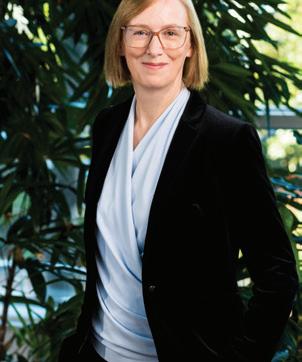





DUBLIN ARTIST PATRICK CAHILL REFLECTS ON A CAREER SPANNING MORE THAN FOUR DECADES CAPTURING THE QUINTESSENTIAL CHARACTER OF HIS NATIVE CITY

While they were scenes of a ghost town scarcely witnessed, they o ered little inspiration to the artist who spent more than 40 years capturing the essence of his hometown in oil and watercolour paintings.


“I brought my camera to take photographs of some key landmarks without people in them,” he says. “While it was both eerie and fascinating on one level, it didn’t inspire anything work-related. For me, I’m always looking for a focal point of an interesting piece of architecture with just the right light, but with plenty of life around it.”
Urban energy runs deep in Cahill’s body of work. Whether it’s the colourful characters wheeling and dealing at the Smith eld Horse Fair, the bustling crowds passing the Nubian princess statues at the Shelbourne Hotel, or the umbrella-wielding pedestrians walking by the Olympia eatre’s portico, his work evokes a feeling of life in motion.
Well-known painter, gallery owner and Joycean scholar, Gerald Davis recognised this theme in Cahill’s work when he o ered Cahill an opportunity to exhibit for the rst time at his gallery on Capel Street. It was the early ‘80s, and Cahill worked at a screen printing company while honing his painting skills and attending art college part-time. Many artists passed through the doors getting prints of their work, such as painters Robert Ballagh, Cecil King, and sculptor Danny Osborne. It was a who’s who of the Dublin art world.

“At that stage, Gerald was coming in a lot for monoprinting. He was almost part of the sta ,” says Cahill. “He’d seen some of my work and o ered to put on an exhibition. I’d provide the paintings, and he’d do all the promotion, like printing invitation cards. So, I gave him the pictures, and he came up with the exhibition title, Of Life and Light. I would have struggled to put a name on it myself, so I said, ‘that’s great, let’s go with it’.”



Cahill says he strives to paint in the traditional way without resorting to shortcuts. “For me, the beauty of painting lies in the spontaneity and simplicity of the handling of the paint. I am primarily an alla prima painter in that I prefer to complete a painting in one session. To do this, I try to solve as many problems as I can before I actually begin painting by making several sketches until I achieve my objective.”

Just a few weeks into Ireland’s most stringent Covid-19 lockdown, Patrick Cahill decided to venture into Dublin city to see what a lifeless capital looked like.Patrick Cahill Prague in the Rain
It was one of two breaks that set Cahill on a path to turning a passion into a profession. e other was having his painting Rainbow Falls, which captured a section of the Royal Canal over owing in Leixlip, selected into the Royal Hibernian Academy, a key institution for Irish artists.
“Getting into the RHA was a big thing back then because once you did, galleries would take notice,” says Cahill. “I was getting contacted out of the blue by gallery owners looking for paintings. It was a real turning point for me.” From there, Cahill worked feverishly from his Leixlip studio, establishing himself as an artist known for so and moody scenes of Dublin using his distinct alla prima style. His art featured permanently at prominent exhibitions such as Kilcock Gallery in spring and the Wexford Opera Festival in winter.
It was in the mid-1980s that Cahill stumbled upon Dublin’s infamous Smith eld Horse Fair, where buyers and sellers met to trade horses on the rst Saturday of every month. e jarveys at St. Stephen’s Green, whom he sometimes sketched, recommended he go take a look.
Cahill was immediately taken by the vibrancy of the market scenes and would spend the best part of 30 years encapsulating its spirit in his work right up until the fair ceased operating in 2011. “ at’s what was so great about the Smith eld Fair – it was horses in an urban environment,” he says. “It was very picturesque, with people, horses and a whole milieu of things going on.”

In the same way artist John Butler Yeats documented the Dublin Sunday Bird Market, Cahill believes there is real value in preserving these unique events through art. In paintings such as Horse Dealer, Having a Chat and Boy Leading a Pony, Cahill expertly recreates the energy and ambience of what was once the only horse market in a European capital.
In recent years, Cahill has found inspiration in places further a eld. He shi ed some of his attention away from the moody urbanscapes of Dublin to the sunny streets of San Francisco and the rickety trams of Lisbon, along with city scenes
from Budapest, Venice, Paris and Prague.
“I get excited by the challenges of drawing, and I nd lots of those challenges in these cities, trying to encapsulate the feel of the architecture, the tra c,” says Cahill. “One thing that has been increasingly fun for me is nding those challenges in fresh places, in cities that are new to me.”
Mixing up his subject matter, being inspired by the new, and keeping things fresh is integral to Cahill’s creative process. “I want to keep it interesting. I don’t like the feeling of being stuck doing the same thing over and over.”

A er over 40 years of his work exhibited in galleries at home and abroad and collected in institutions like the Oireachtas, An Garda Síochána Headquarters, Limerick University, and more, Cahill is focused on developing a stronger online presence and has recently launched a new website. He says not only does it open up his work to a new global audience, but it gives people who are less inclined to visit galleries an opportunity to browse art at their convenience.
“I’ve exhibited in galleries all my career, it’s what I know,” he says. “ ese galleries play a hugely signi cant role in the community, the industry, and how we rethink our towns and cities. However,
Covid taught us a lesson or two about the importance of having that online presence too, so it’s something I need to be part of.”

Cahill is indeed looking forward, but not without some quiet re ection on the past. So, knowing what he knows now, what advice would he give a young artist trying to get a break or considering the feasibility of a career in art?
“If you have a passion, don’t lose the passion. Keep it alive, it’s a gi ,” he says. “How do you make your way in life with that passion? ere is an industry out there, a commercial art industry, an academic art industry. Maybe choose the one that suits you best, follow those channels, and learn what you can. But if you have a passion, it’s a blessing. Nurture it and keep it alive because it is only later on you’ll see the bene ts of it.”
And with that advice, the interview concludes, much to Cahill’s relief. As a humble artist and reluctant interviewee, he much prefers to let his work do the talking. Whether that piece of work is a painting of an atmospheric scene in Dublin, a deal done at the Smith eld Horse Fair, or a gondola ride in Venice, Cahill’s art speaks volumes. And it will undoubtedly continue to do so with art lovers for many years to come.
For more on Patrick Cahill and his work, visit www.patrickcahillartist.com

























Asthe only EU country to avoid the worst effects of the 2009 recession, Poland has in the intervening years developed into a country that boasts steady economic growth, high levels of FDI and a stable banking sector. According to Enterprise Ireland, it’s a great place to do business. Over the last decade, Poland has been steadily improving its business environment and the competitiveness of its economy. The latest data from Enterprise Ireland shows that Poland is Ireland’s
15th largest overseas market, worth over €2 billion in exports, which continues to grow at a rapid pace. Reports and research published by KPMG, Colliers International, EY and PwC, describe the Polish economy as a safe business environment, as it features long-term planning with a low risk of financial crisis and offers good transport connections with a modern infrastructure.
Poland is also renowned for its traditions, culture, beautiful landscapes and architecture. In Poland, there’s something for everyone, whether that’s water sports, sailing, surfing or hiking or something more cultured like a trip to the opera house, concert hall, theatres, galleries and museums.


SMALL FIRMS LOOKING FOR NEW EXPORT MARKETS SHOULD LOOK NO FURTHER THAN POLAND, A REGION WITH AN AFFORDABLE SKILLED WORKFORCE AND A COMPETITIVE ECONOMY
Kraków’s Rynek Główny (Central Square) is the nerve centre of the city’s medieval Old Town. Forever a hive of activity, this 40,000 sq ft medley of cafés, museums, clubs, pubs, music bars, souvenir shops, historical landmarks, hotels and hostels, is punctuated with some of the most magnificent middle age architecture the city has to offer.

W: www.visitkrakow.com/ krakows-market-square/

Located close to the Polish-Ukrainian border, Krasiczyn is a late renaissance castle situated in the south-eastern corner of Poland, close to the historical city of Przemyśl. The region’s scenic landscapes are ideal for cycling, hiking and horse-riding, but even those not partial to sports will be satisfied with the peacefulness and beauty of the area.
W: www.krasiczyn.com.pl/en Krasiczyn Castle
Provided

Hidden from the world and full of secrets and legends, The Wieliczka Salt Mine is an official Polish Historic Monument and a UNESCO World Heritage Site. From Neolithic times, sodium chloride (table salt) has been produced there from the upwelling brine. This major industrial undertaking has royal status and is the oldest of its type in Europe.
W: www.wieliczka-saltmine.com

Known as the ‘Polish Versailles’, this late 17th-century palace can be found in the Warsaw district of Wilanów, 10km south of the city centre. It’s a must see for visitors that want to understand a little more about ancient Poland. The palace, park and surrounding buildings represent the height of Polish Baroque, while the 45-hectare setting is also full of things to do, from visiting the Poster Museum next door to renting a rowboat on the palace’s lake.
W: www.wilanow-palac.pl

Dating back to 1968, the International Festival of Highland Folklore is a seven day festival in the southern city of Zakopane, where folklore bands from all over the world turn the town into a colourful music centre. The event aims to present to the world the music, songs, dances, rituals and customs of mountain people all over the globe.
W: www.zakopane.pl/en/ tourist-area
Bolesławiec pottery, also referred to as Polish pottery, is the collective term for fine pottery and stoneware produced in the town of Bolesławiec, in south-western Poland. Manufactured since the nineteenth century, the ceramics have become a recognisable symbol of the town.
W: www.polish-pottery.pl


ONCE DESCRIBED AS A MAN TOO BIG TO FAIL, ‘QUINN’ BY TREVOR BIRNEY DESCRIBES HOW SEAN QUINN BECAME THE WORLD’S BIGGEST PERSONAL LOSER OF THE ECONOMIC COLLAPSE OF 2008

By
mid-2000s,
He’d established a very strong base on the island of Ireland. Now, as with some of his other ventures, he was going to attempt the same on the other side of the Irish Sea.
It was a huge move. The UK insurance market was highly competitive, with the major companies having built their customer base over decades. There had also been significant change in the industry in recent times, with the advent of selling insurance over the phone, which
the
Quinn had cornered 14% of the insurance market in the Republic of Ireland and 6% on the northern side of the border and had a total of 130,000 policyholders.
THEThis is an extract from Quinn by Trevor Birney, published by Merrion Press, available in all good bookshops, online and as an E-book.
had spawned new companies such as Direct Line. Direct Line cut out the middleman, i.e. the brokers. Regardless of all this, Quinn was determined to step into the market. “Our head office is in Northern Ireland, which is part of the UK. So we were doing business there from day one, and I think it was very early on we made the decision to go into England,” he told The Irish Times
Quinn Direct found a home for its sales support staff in the north of England, at Salford Quays in Manchester. Kevin Lunney was in charge of the rollout and all went according to plan, Quinn believing the company’s model meant it had a significant advantage over its rivals with cost savings passed on to its policyholders. “Prices have reduced by more than 10% on average in the period, in line with previous years, and similar reductions are expected in the current year,” he was quoted as saying in The Irish Times. The company, which had first opened its doors in 1996, was now employing over 1,000 staff at its offices in Cavan, Enniskillen, Manchester and Dublin.
This wasn’t Quinn’s only venture over the Irish Sea during this period, however. In March 2004 he took his helicopter to attend the annual Cheltenham horse-racing festival. The favourite to win the Gold Cup – the festival’s biggest race – was Best Mate, the horse seeking to complete a hat-trick of victories. Every year, thousands of Irish horse racing fans make a pilgrimage to the racecourse an hour north-east of Bristol, the festival usually coinciding with St Patrick’s Day, which adds a distinct green colouring to the racing.
Quinn wasn’t the only Irish businessman to arrive in style in his helicopter. Also there was one of the richest men in Ireland, Dermot Desmond. He began his career in finance at Citibank before moving to PWC and in 1981, at the age of 31, founded NCB Stockholders, which became the largest independent brokerage in Ireland before he sold it to Ulster Bank in 1994 for IR£39 million (at the very time of the festival, Quinn was taking a 20% share in NCB, supporting a management buyout in the deal set up by Conor Killeen). Desmond was raised in Dublin and was very well connected. He’d been one of the businessmen who’d financially supported Taoiseach Charles Haughey, as revealed in the Moriarty Tribunal and reported in the Irish Independent, even going as far as paying for the refurbishment of his yacht, Celtic Mist Like Quinn, he was self-made, but the two men were polar opposites. Quinn was the outsider who revelled in his status as a border chieftain, while Desmond was a smooth, shrewd operator who had amassed his fortune through diverse investments.
At the festival, the two very different businessmen got to know each other over their shared love of racing. But, of course, they were soon talking business and in particular, about a radiator-and-
plastics manufacturing company in which they both had a stake.
Barlo was established in the mid-1960s by Aiden Barlow and was floated on the Irish Stock Exchange, but in the early 2000s its share price was becalmed, valued at less than €50 million. The company’s chief executive, Tony Mullins, went on an acquisition spree, buying a plastics firm in Slovakia and Athlone Extrusions, which manufactured polystyrene sheet and film. But his strategy failed to impress the markets and by 2004, the company became the subject of intense speculation. Tony Mullins put together a management buyout (MBO), which priced the company at €70 million, or forty cents a share. For a bid to be accepted, it required the support of 80% of the company’s shareholders. And Mullins didn’t have it.
During the early months of 2004, Desmond had been quietly buying up shares in Barlo and by the time of the races, he’d built up a 19% stake, primarily through convincing investment house Gartmore to sell its entire holding in Barlo to him. Desmond’s
stake had cost him €7 million. Through Quinn Direct, Quinn had also bought into Barlo, holding 2.4% of the shares while continuing to buy more every day. So when Desmond and Quinn arrived at Cheltenham, they were enjoying the craic and laying down bets on the horses, but their minds were on Barlo.
Quinn wanted to mount a takeover of Barlo, but he needed Desmond’s shares. The two men jousted throughout the festival until the final evening. After Best Mate romped home in the Gold Cup, it was now or never for Quinn. In a box in the stands, he met with Desmond, who was holding out for as much as he could get on the shares which he’d bought for forty-two cents each. They couldn’t agree on how much Quinn would pay him, so the two businessmen decided that the only way to settle the final price was to toss a coin. Quinn won and agreed to pay Desmond forty-eight cent a share, a 15% return or a tidy €1 million profit on his €7 million investment. At the end of Cheltenham, Quinn flew home high on adrenaline. He now controlled 30% of the company.
“KEVIN LUNNEY WAS IN CHARGE OF THE ROLL-OUT AND ALL WENT ACCORDING TO PLAN, QUINN BELIEVING THE COMPANY’S MODEL MEANT IT HAD A SIGNIFICANT ADVANTAGE OVER ITS RIVALS WITH COST SAVINGS PASSED ON TO ITS POLICYHOLDERS.”














8AM I’m not a very early riser as I’m more of a night owl. My husband Simon could be up as early as 5am, but I’m out of bed by 8am and down to the kitchen for breakfast, which is always an egg and brown bread. Barry’s Loose Leaf Tea out of a nice cup sets me up for the day. 9AM From May to September when we have groups visiting the farm, my day is spent on the shore cooking from our Shellfish trailer, shucking oysters and entertaining visitors. In winter, mornings are spent on the laptop, coordinating orders and doing bookwork for the business. We’ve been growing mussels on Killary Fjord for the past 30 years. In that time, the business has changed; today we primarily supply directly to local restaurants and wholesalers on the Wild Atlantic Way. 1PM I prepare lunch for Simon and we sit down together. I’ll often have a quick bowl of mussels and a few oysters mid-afternoon to keep me going until dinner. 2PM A broken arm put me o the road in 2022 so I haven’t been doing my deliveries as I normally would. I make sure I get out every day for a walk though; the ord where we live is truly beautiful. I feed the sheep every day and make sure I get outside to enjoy the breathtaking views. 6PM I’ll close the laptop before having a final check of my emails in the evening. I’m the cook in the house; I love to cook everything and anything but especially Spanish food. A big part of our life is sitting down and enjoying a meal every night. During Covid, I took up gardening and find it a great way to unwind. We grow all our own veg in the garden and I look forward to doing that again this year. 8PM I used to read a lot but now I find I need to get everything done and have a clear head before I sit down to read. If I go to bed with a book, I fall asleep. I’m definitely a night owl and find that I need that time in the evening to fully decompress. I love true crime shows on TV and both my daughter Constance and I love Googlebox. 12AM Bedtime is usually before 1am before it’s time to get up and do it all again!






“THE FJORD WHERE WE LIVE IS TRULY BEAUTIFUL. I FEED THE SHEEP EVERY DAY AND MAKE SURE I GET OUTSIDE TO ENJOY THE BREATHTAKING VIEWS.”
� Airgeadas 6 €10,000 go €150,000
� Tearmai aisiocaiochta 1-10 mbliana
Ratai laghdaithe uis
Airitear le cinealacha airgeadais incheadaithe iasachtai tearma, fru ilcheannach agu s tairgi um mhaoiniu s6cmhainni
Is feidir iasachtai a usaid le haghaidh
lnfheistiocht a dheanamh i dtrealamh ata tiosach ar fhuinneamh mar teaschaideil, paineil ghreine, rialuithe soilsithe, fuaraitheoiri agus fuaraitheoiri sreabhan, coiri uisce trachtala, pointi luchtaithe feithicli leictreacha, srl. chun inbhuanaitheacht an ghn6 a fheabhsu.
Chun a bheith inchailithe chun maoiniu a fhail, ni m6r an trealamh a bheith ar Chlar na dTairgi Tri E de chuid LJdaras Fuinnimh lnmharthana na hEireann {SEAi).
Tabharfar lascaine ar an rata uis a bhaineann leis an iasacht agus agus athruithe le sonru i measc na n-iasacht6iri rannphairteacha.
Fuinnimh ghreine, luchtaithe E measc



Le bheith inchailithe caithfidh iasachtai a bheith ina: Mhicreafhiontar, fiontar bheag n6 meanmheide {FBM) inmharthana, lena n-airitear feirmeoiri agus iascairi; Na criteir inchailitheachta a chomhlionadh.
Tosaitear an pr6iseas iarratais dha cheim trid an bhFoirm larratais Chailitheachta ata ar fail ar shuiomh Greasain SBCI, www.sbci.gov.ie {CEIM 1) a chomhlionadh; Gheobhaidh gn61achtai inchailithe uimhir/c6d inchailitheachta SBCI a chaithfear a sholathar do cheann de na hiasacht6iri rannphairteacha chun tus a chur leis an bpr6iseas creidmheasa {CEIM 2).



Ta tearmai agus coinniollacha i bhfeidhm






























